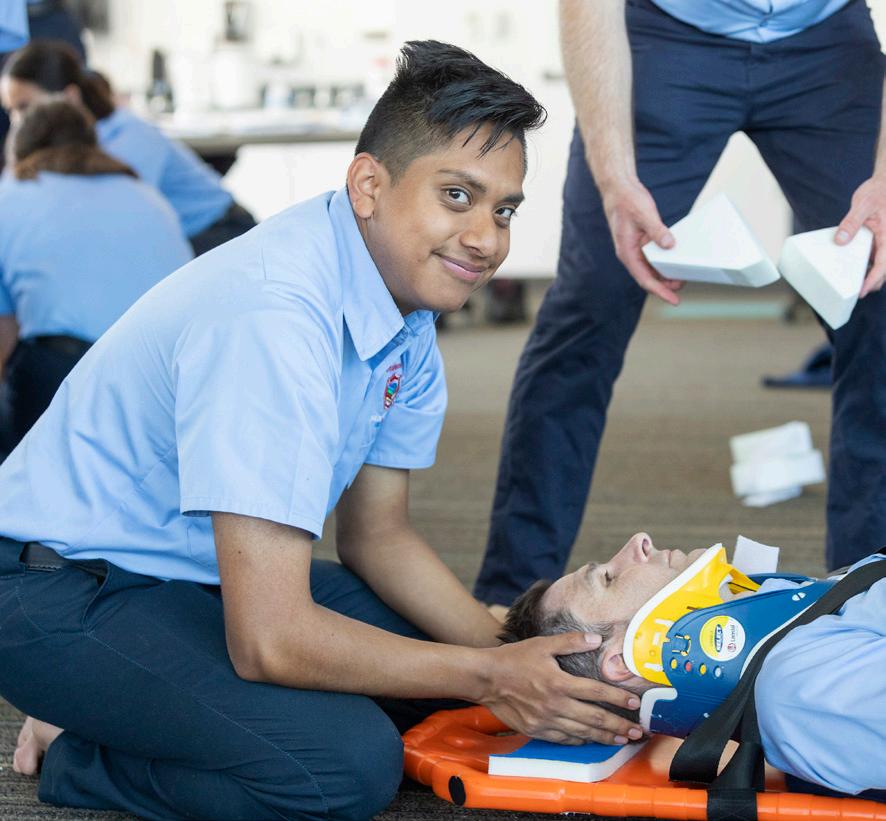City College Mesa College
Miramar College
College of Continuing Education

City College Mesa College
Miramar College
College of Continuing Education

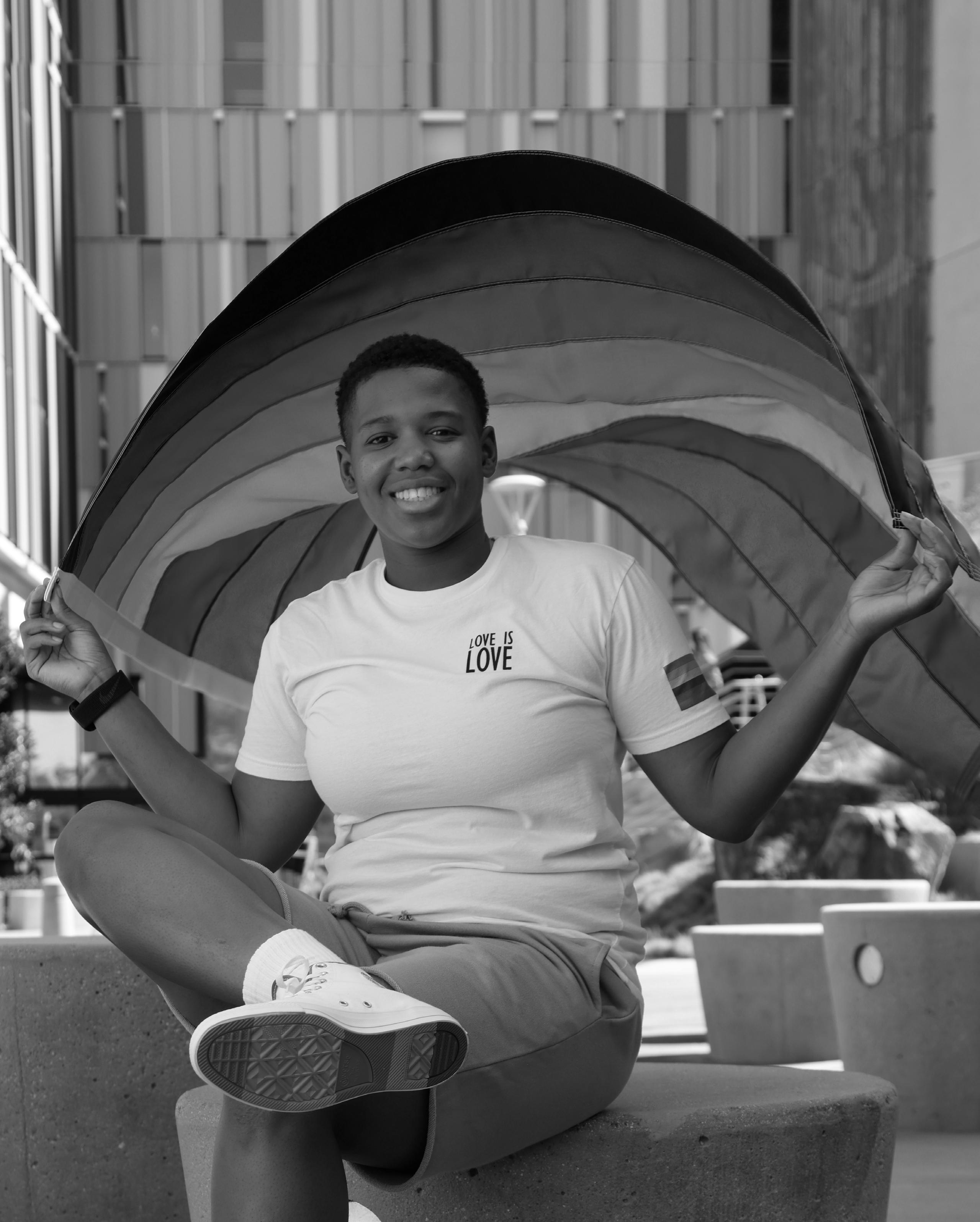
What does the future hold for the San Diego Community College District? How can we serve our nearly 100,000 students and the community even better?
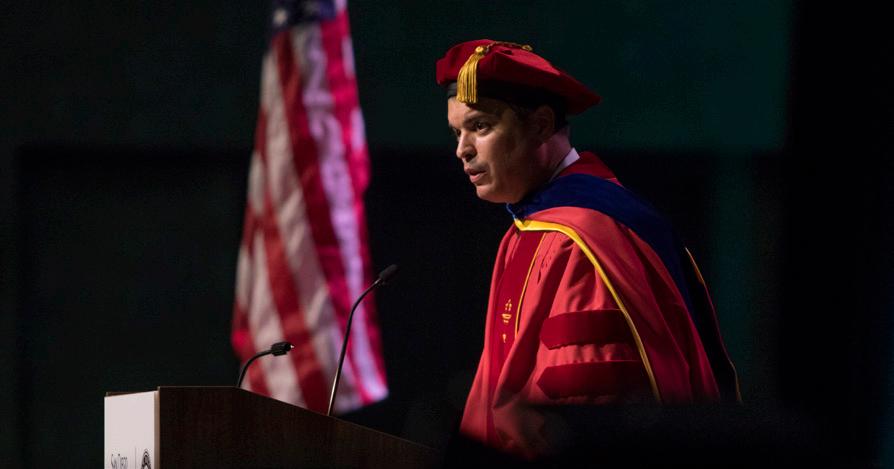
In August, the SDCCD Board of Trustees approved the 2023-2030 District strategic plan. This culminated a sixmonth process that included dozens of meetings, online presentations, and input from roughly 10,000 employees, students, and community members. Hopefully you took advantage of the opportunity to participate. Each day, the District and its colleges affect the lives of thousands of
can fulfill its commitment to equitable outcomes for the nearly 100,000 students it serves annually. Toward this end, the strategic plan includes six primary goal areas:
• Student Success and Well-Being
• Academic Excellence
• Workforce Development
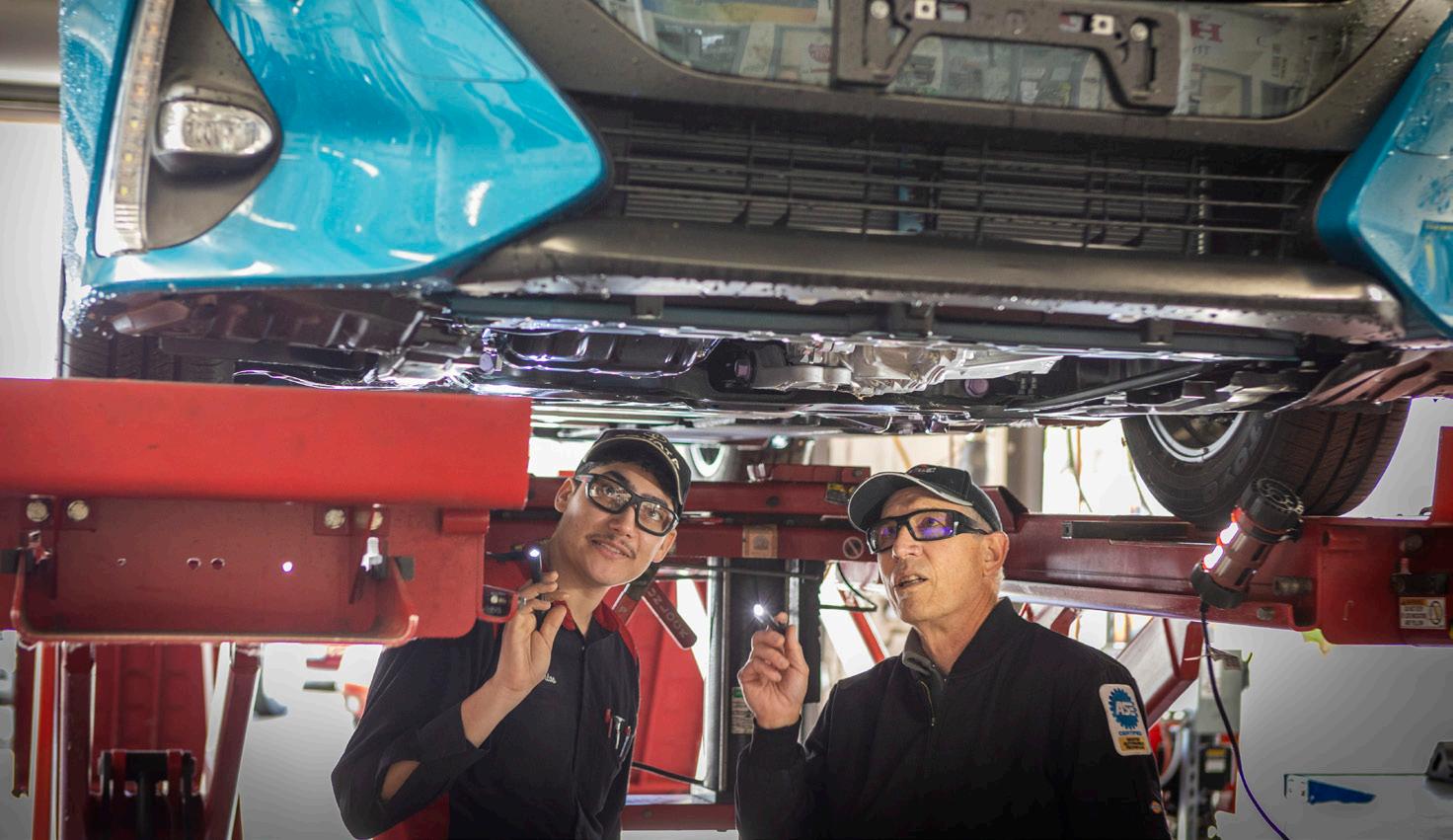
• Financial Health
• State of the Art Facilities
• Institutional Resiliency

With a plan in place, now the real work has begun. Short- and long-term activities are being identified, allowing us to move forward. Workgroups have been established in each of these six areas. In addition, we will continue to seek input and inquiries from the community.
In fact, we are already making progress in some of these areas. The District recently established a new position for a vice chancellor of Institutional Innovation and Effectiveness who will be responsible for overseeing implementation of the strategic plan in the years to come. It was announced at the end of 2022 that San Diego College of Continuing Education Vice President of Instruction Michelle Fischthal will start in this new role on February 1.
San Diegans, and our commitment was to develop a plan that is responsive to your hopes and priorities.
I would also like to acknowledge Susan Topham, vice chancellor of Educational Services, and our consultants, MIG, who were instrumental in facilitating these conversations, which were influential in shaping the final strategic plan. Along the way, we learned a lot about the District (and many of us learned what a planning “charrette” is).
The SDCCD strategic plan will guide the future of the colleges and the District between now and 2030 by identifying our collective vision, goals, and objectives. It builds on and complements strategic plans developed by San Diego City, Mesa, Miramar, and Continuing Education colleges. A key focus of the plan will be how the District
Far from a document that sits on a shelf collecting dust, the strategic plan will evolve to reflect new challenges and new opportunities. As such, timely communication will be important. The new strategic plan webpage, sdccd.edu/strategic-plan, will be updated regularly so you can stay informed. I also will share email updates on a regular basis, and anyone is welcome to come meet with me about this during my open office hours each semester.
Thank you for your continued attention as we work collectively to make the SDCCD the best community college district in the country. The students and community we serve deserve nothing less.
Carlos O. Cortez,
Ph.D.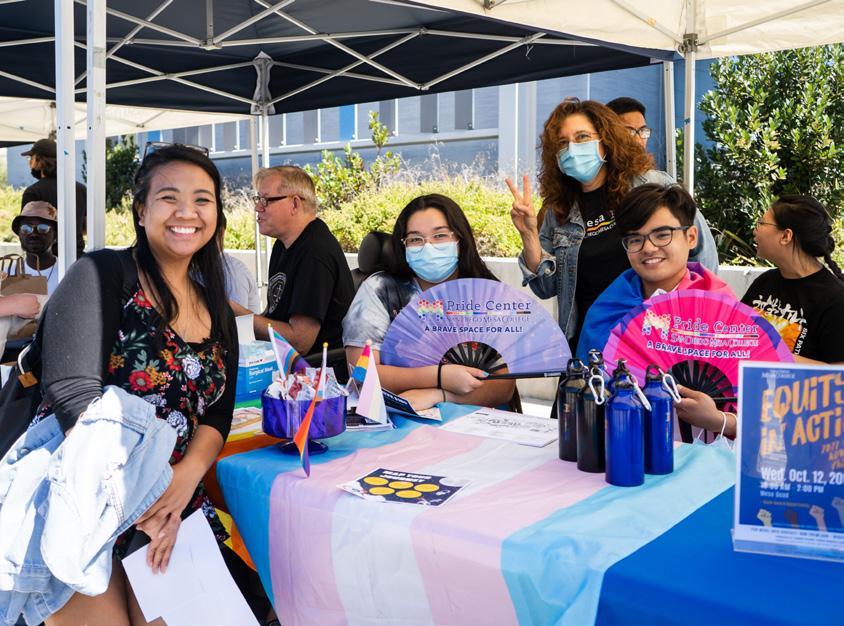
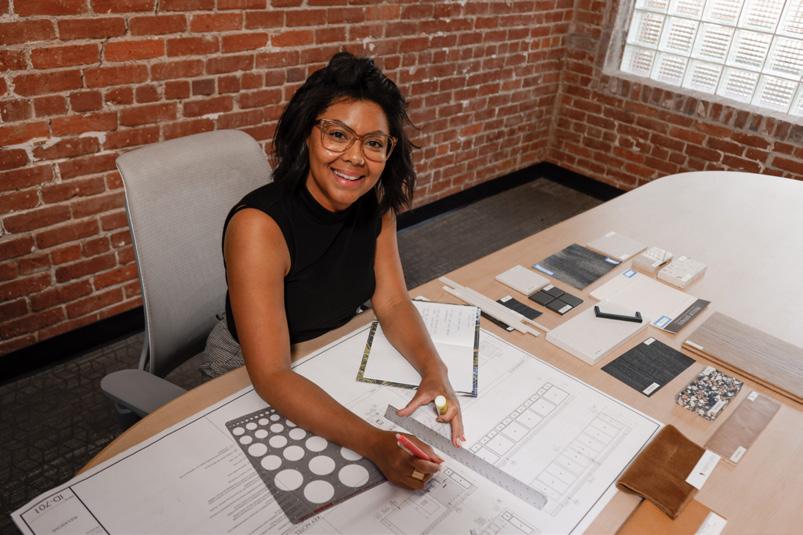
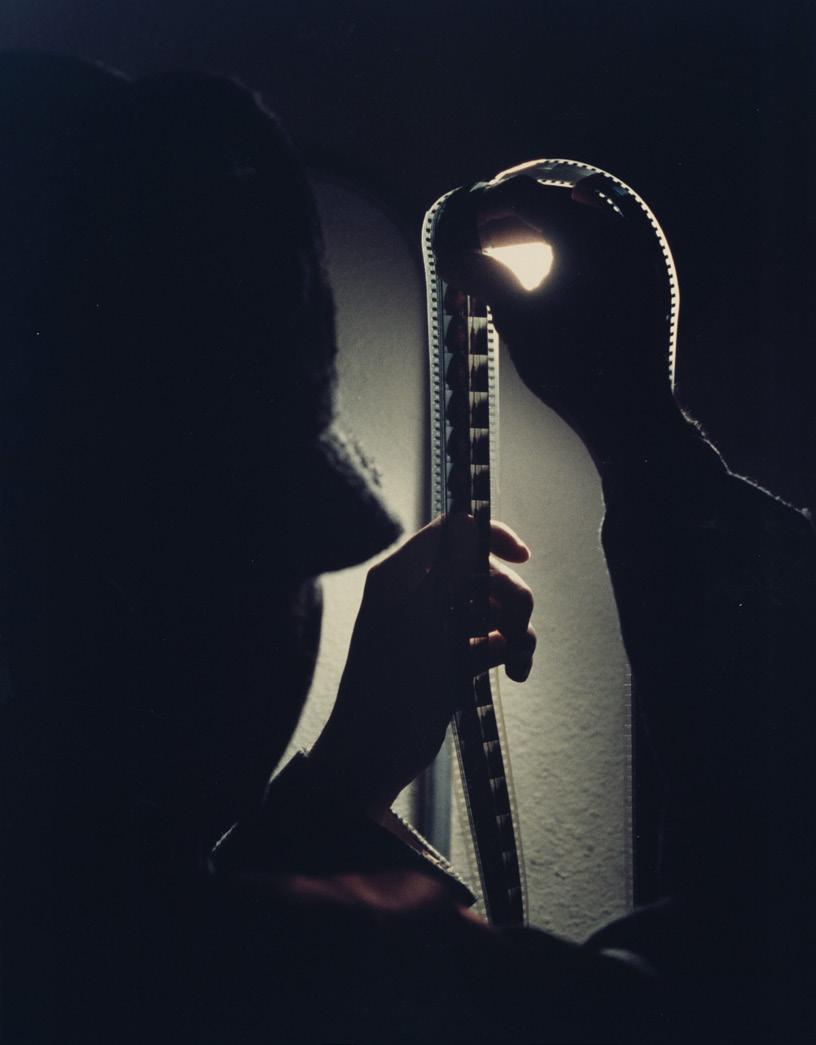
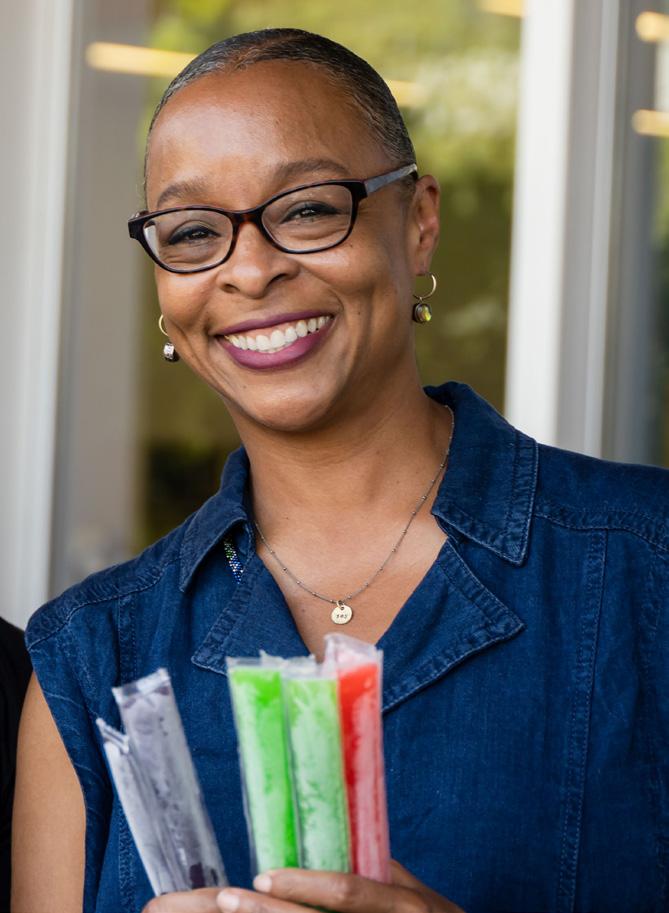
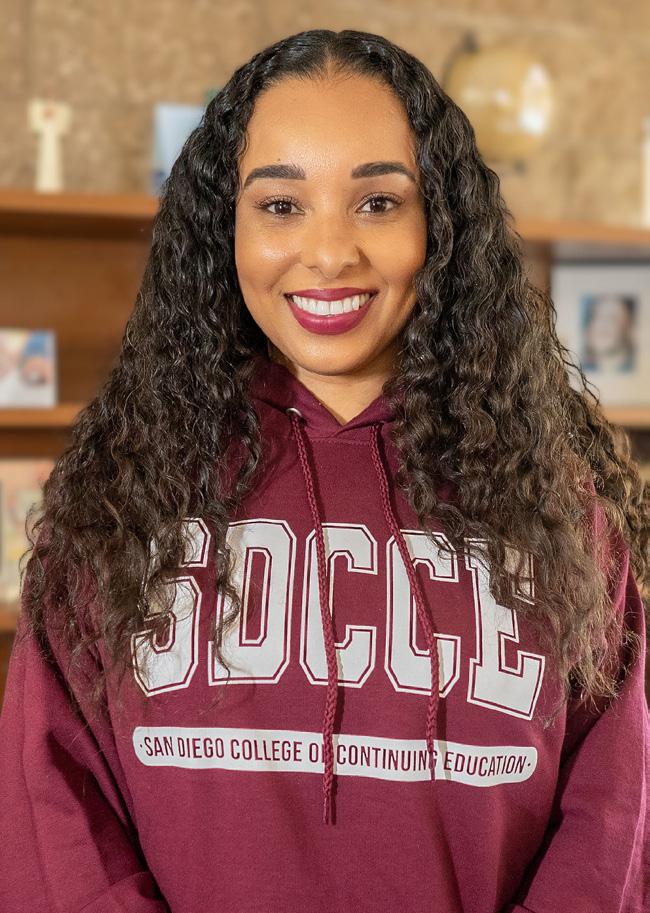
After two decades of working in finance, management, and marketing, David Wilhelm made the bold move to turn to teaching. Wilhelm, who has taught business courses at San Diego Miramar College for eight years now, said he decided to make the career transition because he wanted to educate others about finance and finding success in their business careers.
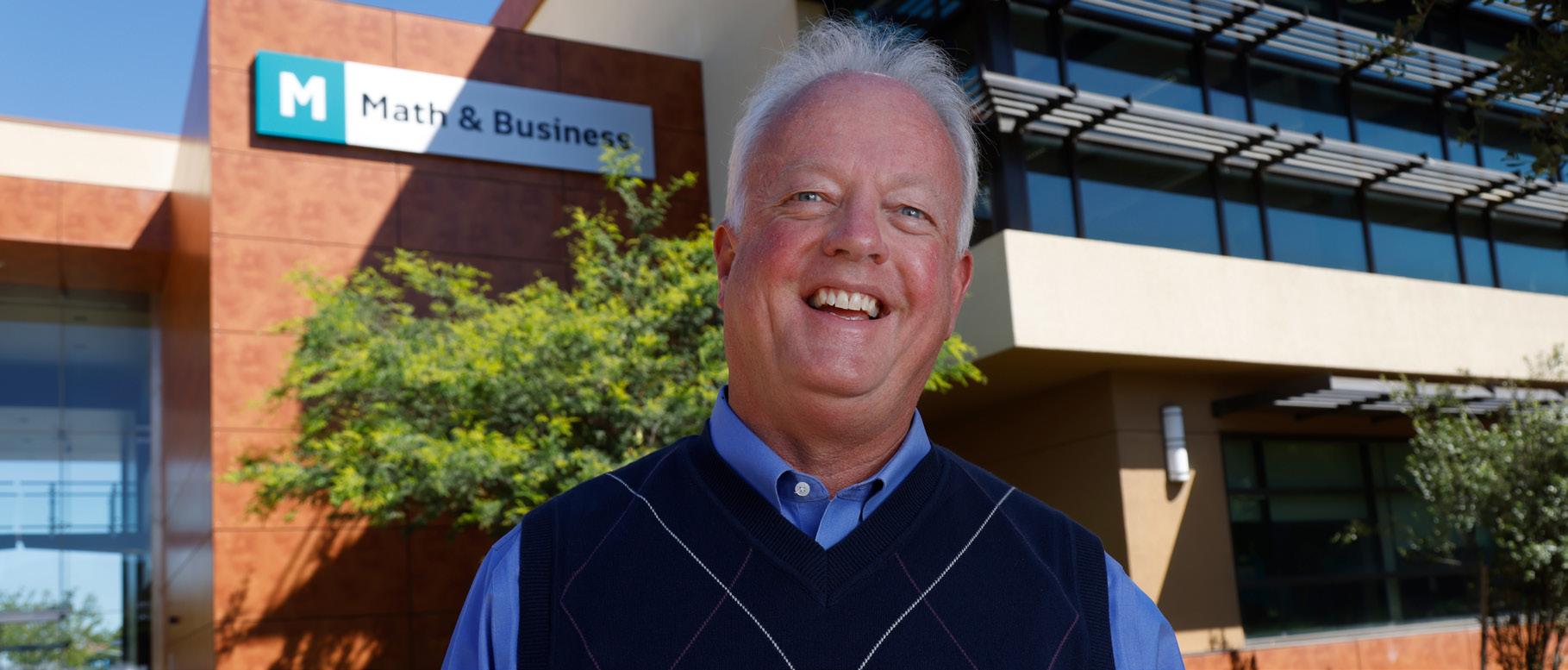
forced to use it. They also remind me how similar they are in the challenges faced in daily life, and the need to be flexible and adapt to change that is often beyond one’s control, such as the effects of the pandemic.
Have any past students reached out to you to tell you about the success they’ve found in the business world thanks to what they’ve learned from you?
Since joining Miramar College, he has done more than educate students. He played a large role in achieving the Accreditation Council for Business Schools and Programs for the college — making it the only nationally accredited two-year business program in the region.
In addition to teaching, Wilhelm regularly contributes to WalletHub, a website that offers educaitonal information about personal credit, and serves as a financial expert to other outlets. The biggest financial advice he has for everyone?
“Set a specific goal, spend less, and save, save, save!”
Wilhelm spoke to With Excellence (WE) about what drives him, his curriculum, and what kind of legacy he hopes to leave at Miramar College.
What makes your class-
es stand apart from other typical business classes? What kind of lessons do you try to incorporate in your curriculum?
My broad industry experience in functional areas of marketing and finance complements my academic background because the knowledge gained has guided and shaped curriculum improvements, which help students understand how concepts introduced in the classroom apply in practice.
One approach, which has been tremendously successful with students over the years, is to discuss current events in business and how they relate to the concepts introduced in the course. A student pairs with another student in class to review and discuss the topic and how the current event relates to the concepts
introduced in the class.
What is the best day you have had as a business professor at Miramar College?
The best day for me is every day when I first walk into the classroom and see 40 eager students who represent the future as business professionals in our community. It is a privilege for me to be able to influence and encourage them to achieve their full potential in life, which makes it my best day.
Of course, your job is to teach students. But, sometimes professors can learn a thing or two from their students. What have your students taught you over the years?
Several students literally teach me how to use new generations of technology. I am from the Baby Boomer generation and many of us resisted technology until
I hear from several former students on a regular basis — many of whom are enrolled in graduate school or working as a professional in an organization with tremendous potential for future success. One former student, who graduated from SDSU with a degree in finance, is currently working for Vanguard Investments as a financial manager and has been promoted twice in the firm.
I feel so fortunate to have known and worked with many of these very bright and talented individuals while they attended Miramar College.
When you retire someday as a business professor, what do you hope your students will say about you?
I hope they say that I was someone who motivated them to achieve their full potential and made a valuable contribution in their life!
The San Diego Community College District’s economic impact totaled $4.3 billion in the 2021-2022 fiscal year, an amount equal to 1.6% of San Diego County’s total gross regional product and enough to support 45,365 jobs, a new study shows.
According to Lightcast, the labor market data firm that conducted the study, the District’s $4.3 billion impact is the equivalent of San Diego hosting 12 Super Bowls.
“The latest findings are beyond profound and illustrate in detail how the San Diego Community College District is a major driver of the local economy,” said SDCCD Chancellor Carlos O. Cortez.
Highlights from the Lightcast report include:
• The SDCCD employs 4,645 full- and part-time faculty and classified professionals, nearly all of whom (96%) live in San Diego County and spent much of their combined earnings of $326 million in the region.
• Combined with spending on day-today operations, the SDCCD added $504.7 million in income to the county during the year. That added income is equivalent to supporting 5,891 jobs in the region.
• SDCCD students who earn an asso -
Thanks to a new program being piloted at California community colleges, earning college credit for prior learning through service is about to get a lot easier for veterans and current military members.
San Diego City, Mesa, Miramar, and Continuing Education colleges have joined the Military Articulation Platform (MAP) in an effort to help students and veterans maximize academic credits for prior learning acquired through military service and industry certifications.
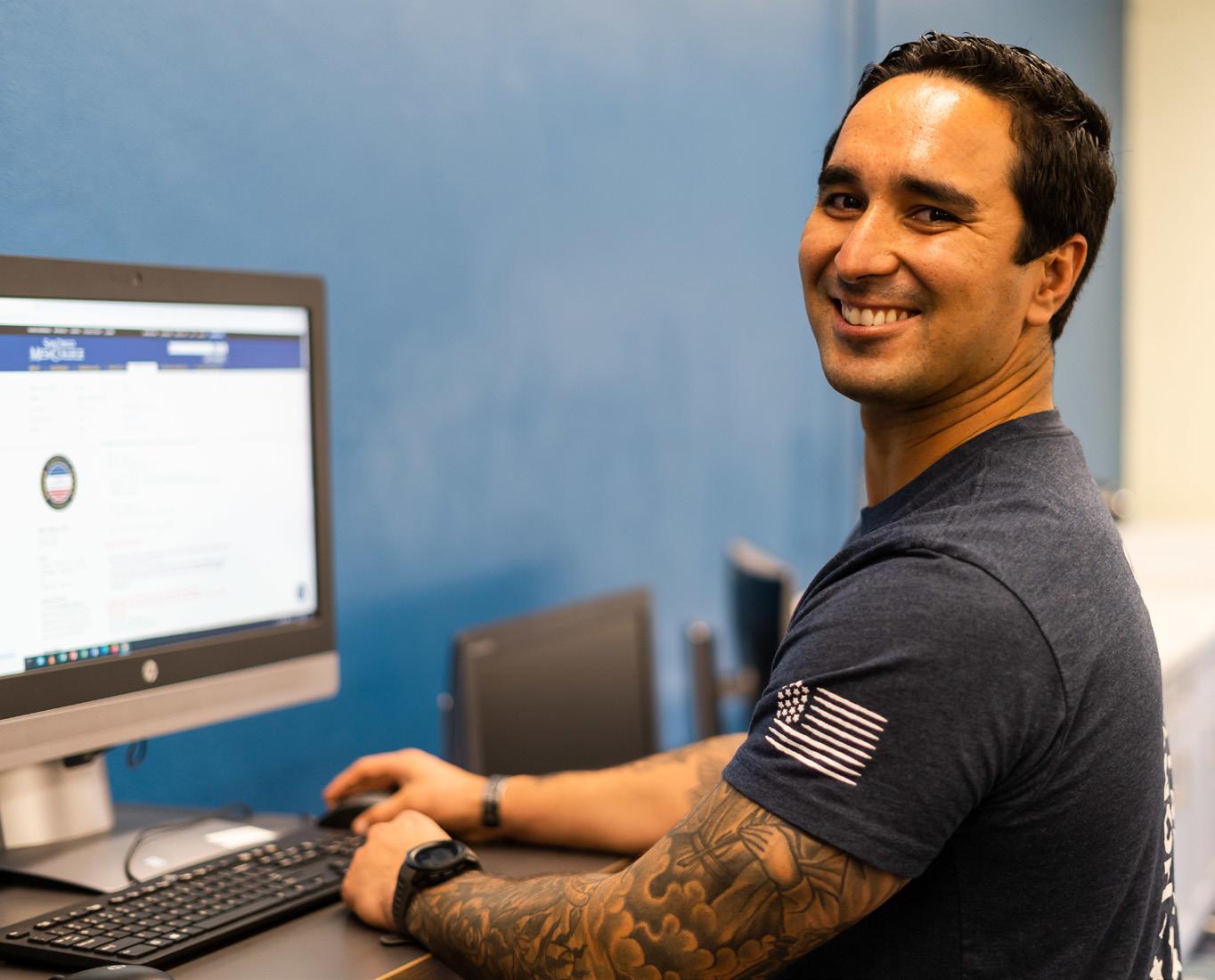
The four colleges have been asked to pilot non-military credit for prior learning, including industry certification and noncredit to credit agreements or credit by examination through the MAP project.
MAP is a cloud-based system that matches college catalog courses to American Council on Education Military Guide recommendations. Once the matches are approved by faculty via the curriculum approval process, they
are stored in MAP and offered as college credit to incoming veterans.
“It’s really exciting to take part in this cohort and be able to expand and be part of the different pieces of the MAP pilot project,” said Shelly Hess, dean of Instructional Services at the SDCCD.
Once all four colleges are integrated fully into the system, students will be able to upload their transcripts into MAP and find out which credits they can receive for courses they have taken and occupations they have held prior. In the 2020-2021 academic year, nearly 3,000 students in the SDCCD were active military or veterans.
City, Mesa, Miramar, and Continuing Education colleges are just four of 52 colleges selected for MAP’s phase three cohort, which began in January. Twelve colleges of the Inland Empire Desert Regional and Saddleback College have already completed phase one and two of the platform’s development and
SDCCD student population that is active military or veterans
deployment.
MAP phase three is supported and paid for by a legislative grant sponsored by Assemblymember Sabrina Cervantes of the
ciate degree will see annual earnings that are $9,900 higher than a person with just a high school diploma or GED working in California. That amounts to more than $376,000 in higher earnings during their working lifetime.
• Alumni benefit taxpayers by generating savings via lower healthcare costs, a lesser strain on the justice system, and a reduced need for social services.
Altogether, the analysis found that the present value of the benefits associated with an SDCCD education will generate $114.2 million in savings to state and local taxpayers.
60th District (Riverside County). Use of MAP is free for the participating colleges. The system is administered by the Riverside Community College District at the Norco College Veterans’ Resource Center.
For more information about support and programs available for veterans and military members, visit the Veterans/Active Duty webpage under the “Future Students” tab at sdccd.edu.
Through its work in community engagement and advocacy with government officials and local business leaders, the San Diego Community College District recently received several grants to help support student success among its colleges. Recent grant highlights include:
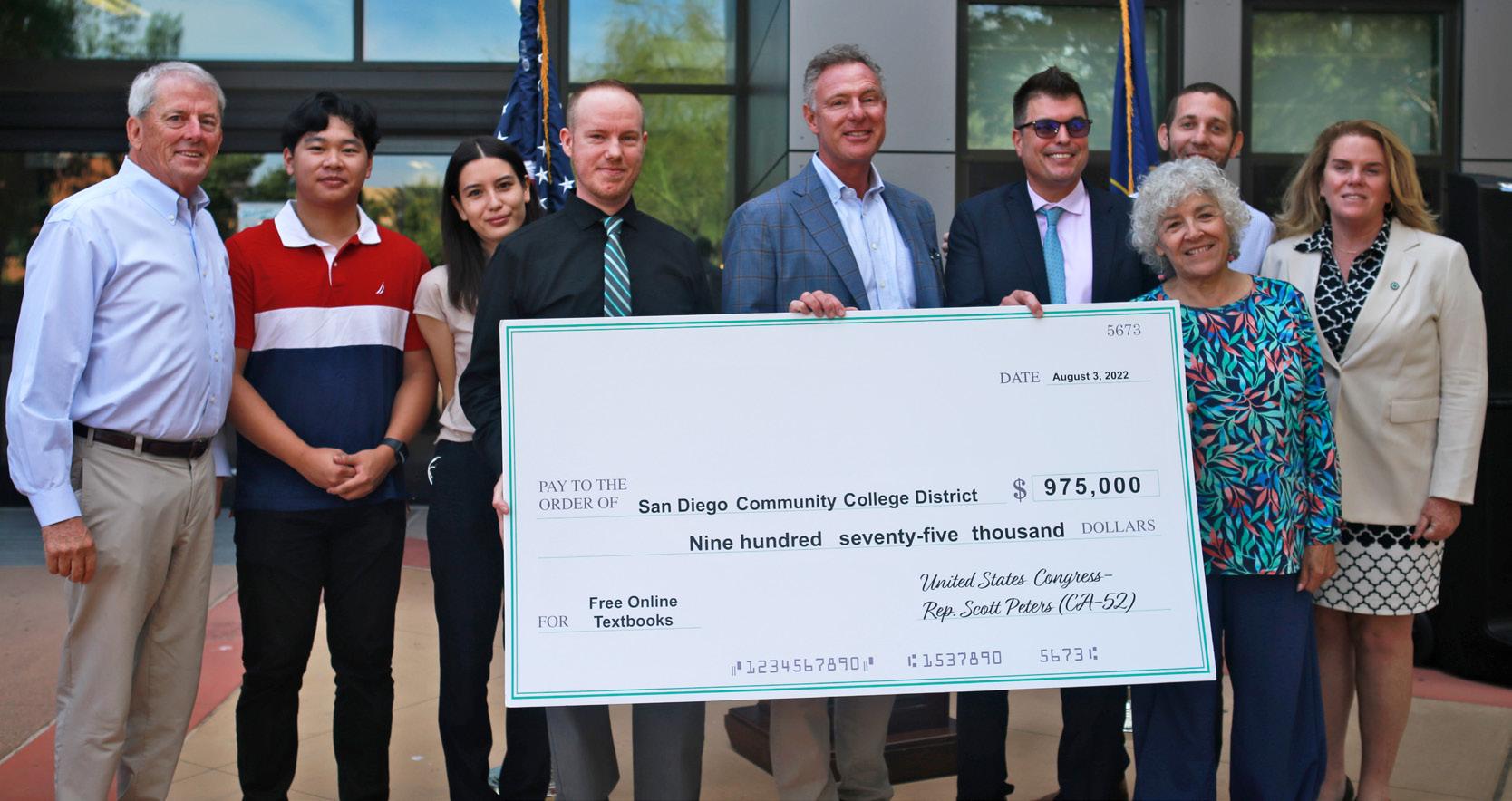
The San Diego Community College District received a $975,000 federal grant to expand a program that provides free online textbooks and resources to students, saving them the cost of buying expensive books for their classes.
“Lower costs for textbooks help community college students deal with one less burden as they pursue their academic goals,” said Rep. Scott Peters who helped secure the Community Funding Project funds. “With rising costs of tuition and textbooks, programs that expand affordability encourage students who need the most support. I thank San Diego Community College District for this work and hope to see more programs like this one in many other districts.”
The grant money will be used to develop more zero-textbook-cost courses, which use digital materials that are free to students. Textbook prices, which have risen more than 800% since 1978, can be a prohibitive cost for many students, who on average spend about $1,200 a year for textbooks.
Last year, students at San Diego City, Mesa, and Miramar colleges were able to save more than $3 million in educational costs. In addition, educational materials created through this grant will carry a Creative Commons license label, which means that colleges and students statewide will have free access to them. The grant will expand previous projects from faculty, staff, and the bookstores to develop zero-cost textbook courses.
“The cost of buying textbooks can often be more than our students are paying to take classes at our colleges,” said Carlos O. Cortez, chancellor of the SDCCD. “Offering more zero-textbook-cost classes is part of our District’s
commitment to making sure all students have access to education.”
The San Diego Community College District is doing its part to keep California safe by limiting wildfire risk thanks to a new Arborist/Utility Line Clearance Training program through San Diego College of Continuing Education. To fund the critical work, San Diego Gas & Electric awarded a $1,255,800 three-year grant to the SDCCD’s Employee Training Institute (ETi).
The tuition-free program is a 200-hour five-week training to become a skilled arborist who supports California in preventing fires by clearing trees away from utility equipment and lines. Graduates leave the program prepared to be safe and productive workers on a line clearance crew.
SDG&E’s grant permits the development of and scholarships for the Arborist/Utility Line Clearance Training Program, which began in April and will run through July 2025.
“The SDCCE Foundation is excited to bring awareness to the arboriculture industry and as a result of SDG&E’s generous training funding, low-income San Diegans are entering a high-demand, high-wage career path,” said SDCCE Foundation CEO/Executive Director Laurie Coskey, Ed.D., who helped secure the grant.
Designed by industry experts, the program gives entry-level students skills that a utility line clearance arborist apprentice would learn in the first six months on the job. Upon successful completion, students will receive training in techniques such as First Aid/ CPR, OSHA 10, flagger training, fire safety prevention, chippers, chainsaw usage, ropes,
knots, and climbing.
Training takes place at California Conservation Corps, Urban Corps of San Diego County, and San Diego College of Continuing Education.
Miramar College received $2.5 million from the state of California to upgrade resources available to its veteran and active-duty military students and their dependents. The funding, spearheaded by Assemblymember Brian Maienschein, was part of Governor Gavin Newsom’s 2022-2023 state budget passed this summer. These funds will provide enhanced services and infrastructure for the college’s military community, which includes approximately 2,000 veterans, active-duty military, and their dependents.
Miramar College will use a majority of the funding to renovate and complete its longplanned Veterans Resource Center, now located on the ground floor of the I-Building. The new facility will expand from its current 1,000-square-foot space to 3,000 square feet. The larger VRC will be equipped with new furniture, private study and meeting rooms, along with a student lounge. Infrastructure enhancements will include LCD screens, projectors, laptop loaners, and internet upgrades.
Additionally, Miramar College will provide an upgrade to its satellite teaching facility at Marine Corps Air Station Miramar (MCAS). The center will also provide expanded peer mentoring, tutorial, admissions, orientation and mental health counseling services.
A portion of the funding will support emergency grant aid that will assist veterans and their families with basic needs.
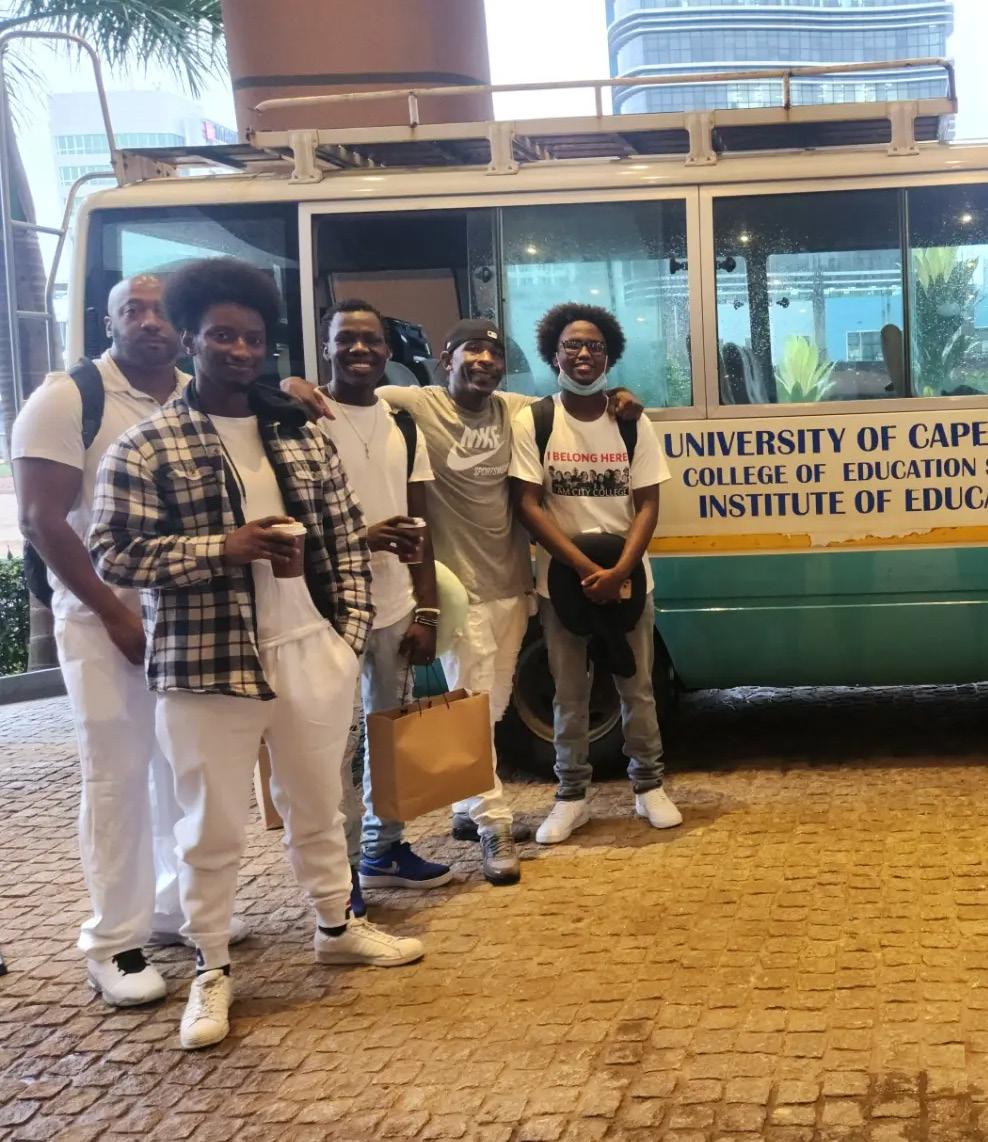
Arecent trip to Ghana provided a new perspective on Africa for San Diego County community college educators and students, and ignited a push to highlight the important role that the continent and its people have made to the world. “It was the experience of a lifetime,” said Michael Whyte, a San Diego City College student who was part of the group that attended the 2022 All African Diaspora Education Summit in Ghana. “It makes you look at everything differently. It puts everything in perspective.” The summit was held September 19-24 at the University of Cape Coast, and representatives attended from all the community college districts in San Diego County — Grossmont-Cuyamaca, MiraCosta, Palomar, San Diego, and Southwestern.
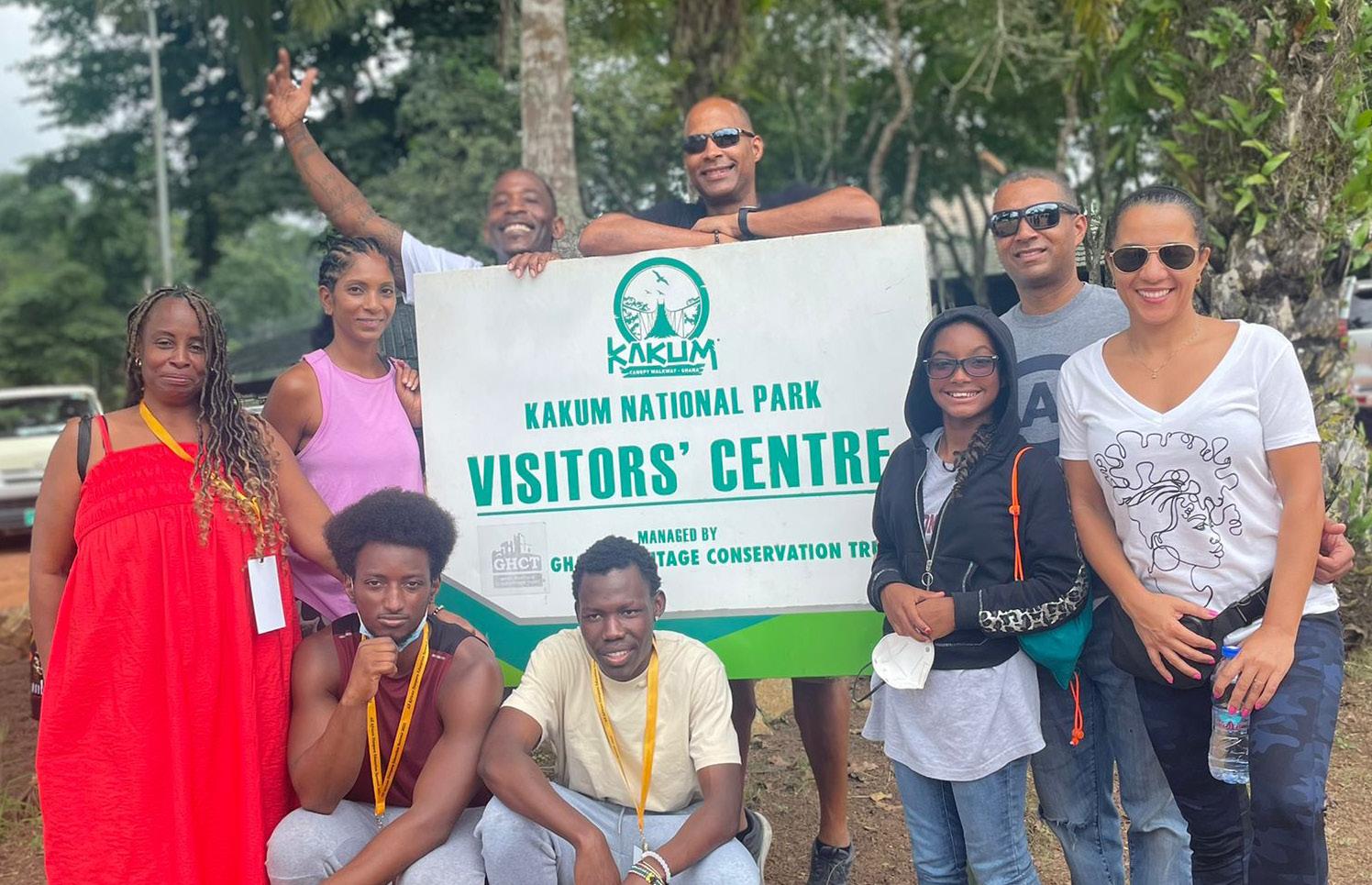
Activist and equity-centered leader,Ashanti Hands, Ed.D., began her position as president of San Diego Mesa College, the leading college of equity and excellence, on July 1. Since that time, President Hands was accepted into the Aspen Institute’s New Presidents Fellowship, served as a “Presidential Equity Champions” panelist during the fall 2022 California Community College Chief Instructional Officer Conference, and launched a “Weekly Updates from Prez Hands” newsletter to connect with the community and share the collective success of the college.
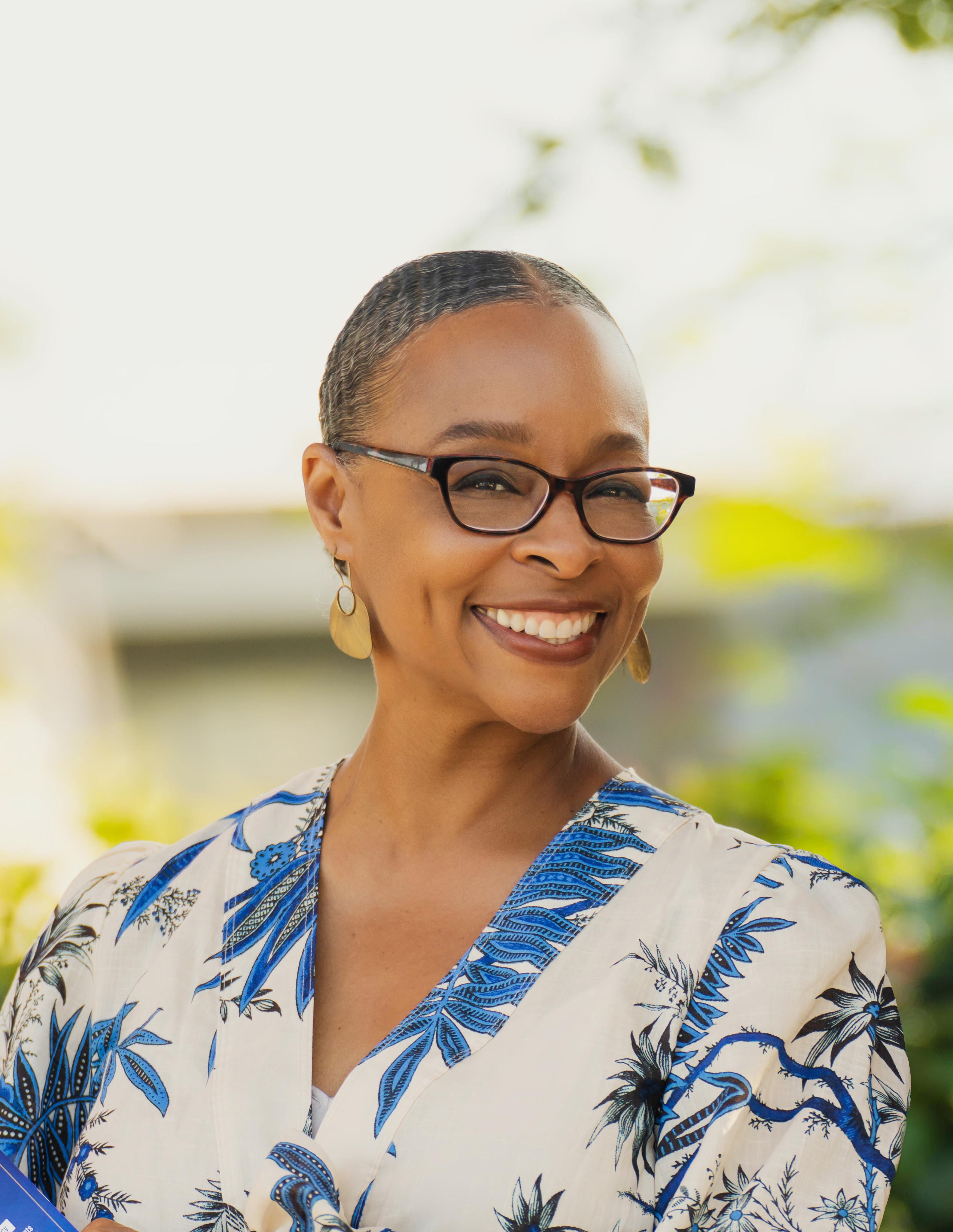
From serving on the frontlines of food insecurity to marching in the San Diego Pride Parade, becoming president was a leadership role Hands was destined to fulfill from an early age.
“I witnessed first-hand during middle school and high school the inequity and social injustices in the classroom,” said Hands, who grew up in Inglewood, Calif.
Mesa College made a pledge to be the leading college of equity and excellence in 2014, when Hands was dean of Student Affairs — a position she took on in 2008 — and she said is looking forward to continuing to move that commitment forward during her tenure.
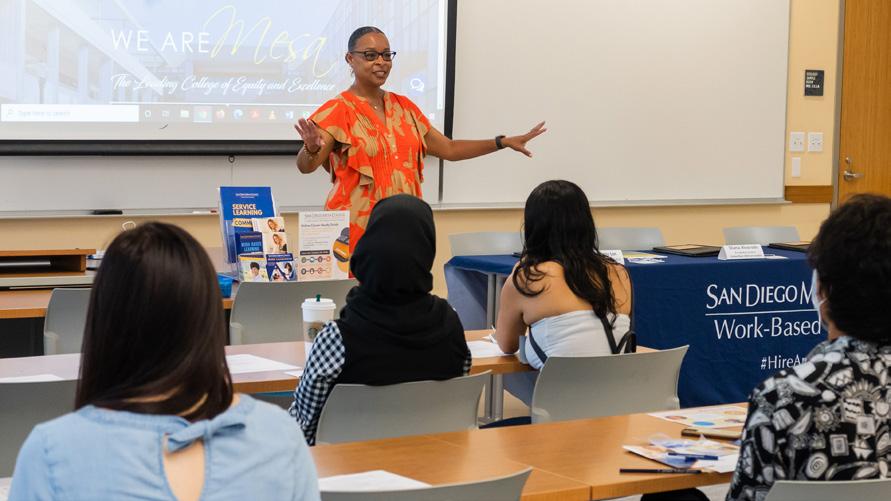
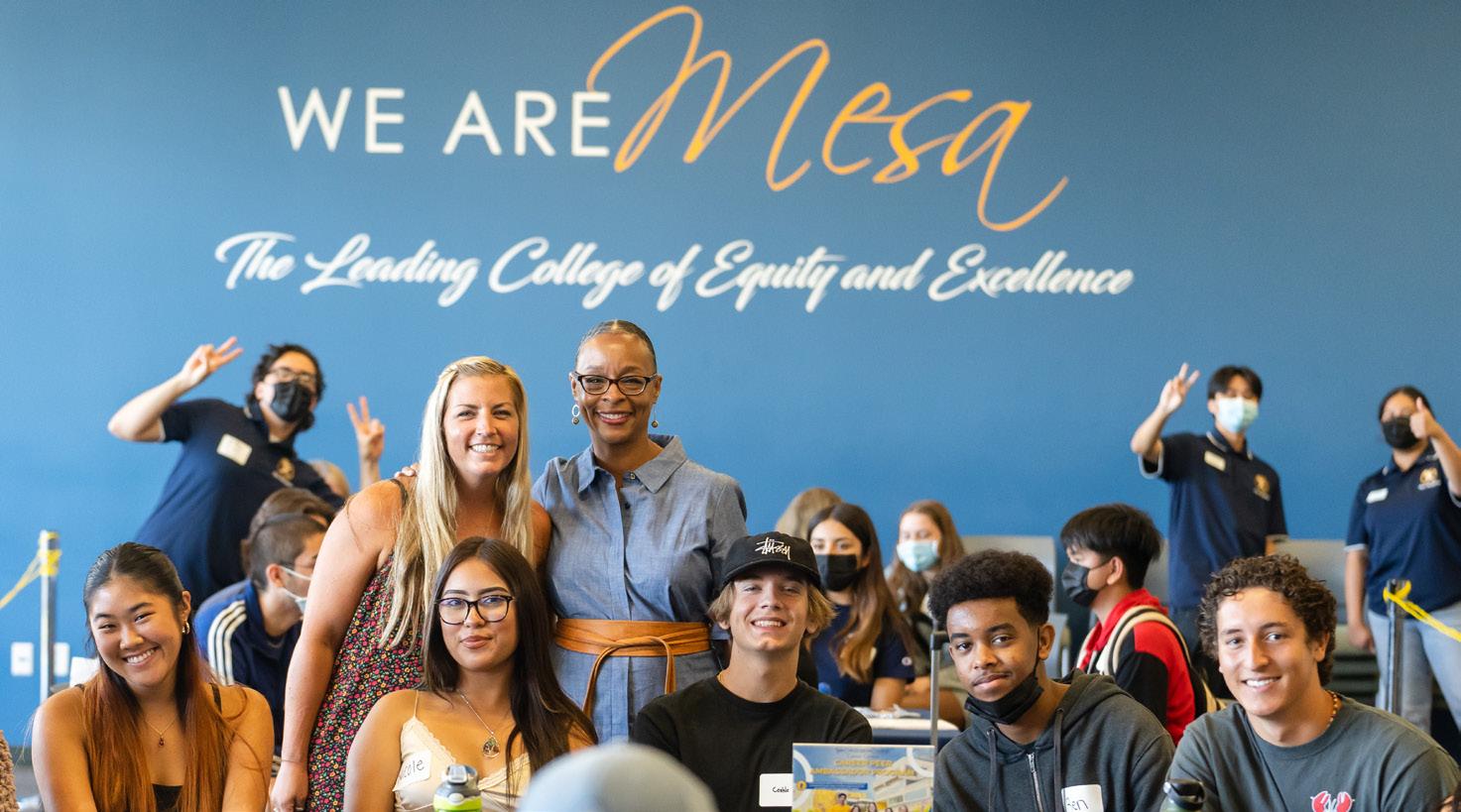
“Equity is infused with every goal and is woven into everything that we do here,” said Hands. “Our goals hold us accountable to be who we are and do what we say we are going to do.”
As president of Mesa College, she leads a college that serves 30,000 students per year, making it one of the largest community colleges in California. The college offers nearly 200 associate degree and certificate programs and is one of 15 California community colleges offering a four-year baccalaureate degree. A fully accredited, comprehensive community college, Mesa College ranks as San Diego’s top transfer institution, and a Military Friendly School, serving more than 3,500 veterans and their families.
Mesa College, designated as a Hispanic-Serving Institution, has been particularly successful in serving minoritized students, in part due to several federal grants it has won, including two Hispanic-Serving Institution grants. Most recently, the Department of Education (DOE) awarded Mesa College an Asian American and Native American Pacific Islander-Serving Institutions (AANAPISI) grant, which is a multipronged, evidence-based effort designed to reduce equity gaps and increase the academic success, retention, graduation, and transfer rates of Asian American and Native American Pacific Islander (AAPI) and low-income students. Mesa College was the first community college in the region to be awarded an AANAPISI grant
Hands succeeds Pamela Luster, Ed.D., who previously served as president of Mesa College from 2011 to 2022. “Dr. Luster understood her mission and sparked my legacy,” Hands said. “The way she gave back to everyone around her is how I want to make others feel. I want students to know I see them for who they are and that I see their potential.”
Hands leads Mesa College guided by the Mesa2030 plan, a master strategic and educational guide to improve the quality of students’ experiences by delivering
a learning environment characterized by equity and excellence. Over the next decade, Mesa College’s top priorities are to transform pathways and partnerships, stewardship, scholarship opportunities, completion rates, and build community.
“Mesa2030 is our north star guiding light,” said Hands, who developed Mesa2030 alongside Luster and Mesa College administration, faculty, classified professionals, and students. Mesa2030 was named as a finalist for the prestigious Bellwether Awards in 2022.
Inspired by John Lewis’s advocacy for good trouble, Hands explains her desire to provide equal educational opportunities for others comes from deep-seated lived experiences. In the fourth grade, a passion for social justice was sparked when she realized getting bussed into an affluent area to attend a better school across town away from Inglewood was not equitable. A mentorship under her principal at Inglewood High School helped her learn about equitable education and influenced the rest of Hands’ future in academia — a support system that also helped her through her undergraduate time at University of California, San Diego.
“I remember being asked to leave the classroom for screaming out for my teacher to teach me. While sitting in the office, I overheard my principal fight against structures for basic things we needed,” she said. “My school district served large populations of African American, Black, and Latinx students; we had hopes and dreams and no one to dream with us.”
She continued, “My principal would tell me that Inglewood High needed people like me. I felt really excited to get involved, like in the movies, the seed was planted and made me want to do something.”
While in high school, she started to advocate for her school, low-income students, and access to education, while also attending board meetings.
As president, Hands uses those personal events to improve outcomes for traditionally underrepresented students at Mesa College. Fostering a sense of belonging through campus renovations, expanding accelerated workforce education, guided pathways and increasing enrollment and transfer rates are among her critical initiatives.
• Doctor of educational leadership from San Diego State University
• Master of arts in education with an emphasis in multicultural counseling from SDSU
• Bachelor of arts in sociology from University of California, San Diego
• Vice president of Student Services and dean of Student Affairs at Mesa College
• Dean of Student Affairs at the University of California, San Diego
Social justice reform, affordable housing and wellness for students and faculty drive focus of new SDCCE President Tina M. King, Ed.D.
San Diego College of Continuing Education welcomed Tina M. King, Ed.D., as its new president on July 1. A humanitarian academic leader, her life’s work — driven by social justice reform — mirrors SDCCE’s mission to provide accessible, equitable, and innovative quality education and career training to adult students.
King is SDCCE’s first female, Afro-Latina president since Dr. Lillian Beam in 1990. She succeeds Carlos O. Cortez, Ph.D., who became chancellor of the San Diego Community College District in July 2021.
“I am honored to join SDCCE, which is woven into the history of America, and to join a District known for its social justice values, and that has always pushed students at the forefront,” King said. SDCCE is one of the state’s largest providers of free workforce training and is the noncredit college at SDCCD. Before becoming a part of the SDCCD, the college, which also played a role in the national civil rights movement, began in 1914 inside classrooms at San Diego High School.
SDCCE’s work is deeply personal for King, who comes from a migrant family. Her grandparents on her mother’s side, born in Mexico, were farm workers in the 1970s. Her father’s parents came from Southern states — Louisiana and Mississippi — during an era of major racial oppression.
King’s mother raised her and her five siblings while going back to school in her 30s, at a noncredit institution in Los Angeles, to earn a high school diploma/ equivalency and a certificate in management. The certificate opened doors for her mother to begin working at a Los Angeles Unified School District cafeteria 30 years ago — she will retire in a couple more years as manager.
“Her achievement changed my entire family’s trajectory,” said King, who credits her mother as the driving force behind her long-term career in academia.
King was named a 2021-2022 Aspen Rising Presidents Fellow, a selective leadership program that prepares top education professionals to become highly effective leaders of community colleges.
With a notable passion to remove barriers for students of color and social justice, King is a perfect fit for SDCCE where students are among the most vulnerable populations in California. Immigrants, refugees, and English language learners make up half of the student body of 30,000 students at SDCCE’s seven campuses across the city, spanning from Barrio Logan to Miramar. People enroll at SDCCE to rebuild or create lives in the United States through free workforce training certificate
programs, English as a second language (ESL), citizenship, and high school diploma/equivalency classes.
“We are the people’s college,” King said. “That is what I love about SDCCE; it’s heavily rooted in community, social justice, and activism.”
Bringing affordable housing to SDCCE campuses for students and employees, opening health and wellness centers, and restoring SDCCE’s historic Educational Cultural Complex — with help from a $35 million renovation grant from Governor Gavin Newsom’s 2021-2022 state budget (sponsored by Senator Toni Atkins) — are among King’s key areas of focus during her first year as president.
As San Diego’s economy recovers from the COVID-19 pandemic, businesses are in desperate need of skilled workers. For King, this is an exciting time to boost enrollment, and to seek additional fundraising and development to open inaugural health and wellness centers, LGBTQIA+ centers, and build upon paid pre-apprenticeship opportunities. She will work alongside District leaders, including Chancellor Cortez, to bring affordable housing to SDCCE campuses for students and employees. The college would be the only noncredit institution in the nation to offer housing.
“My priority is to support students in gaining real world industry experience to place them in jobs with living wages,” said King, who also is actively seeking to expand SDCCE’s industry partners in priority workforce sectors. Current partners at the college provide students with entry-level jobs in the information technology field, hospitals, and with pre-apprentice opportunities or direct pathways into union wages and benefits.
Just weeks after starting her new position as president, King made her first public appearance during the July San Diego Pride Parade, where she marched alongside her husband, Frank Harris, III, Ed.D. — a professor at San Diego State University — and their children.
“Everything I do, I make sure my family is a part of it,” she said. “By including them in events such as the San Diego Pride Parade, I am showing them how transformational SDCCE is — a symbol of civil rights and justice.”
• Doctor of education in educational leadership from California State University, Fullerton. Her dissertation focused on the role of community college faculty and staff in creating academic achievement for Black men.
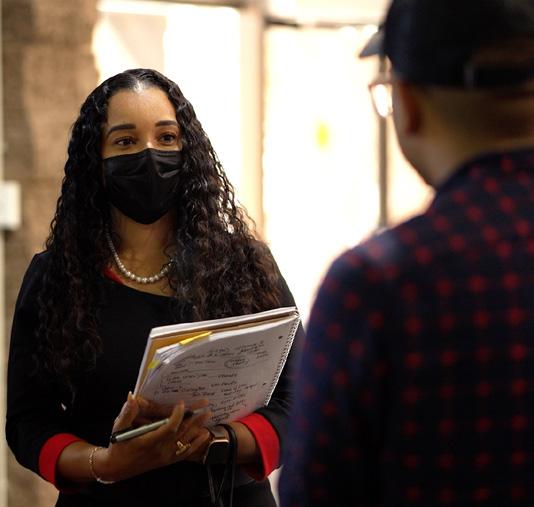
• Master of arts in education from the University of Southern California
• Bachelor of arts in liberal studies and multiple-subject credential from California State University, Northridge
• Assistant superintendent/ vice president of Student Affairs at Southwestern College
• Interim dean of Instruction and Student Services and director of Institutional Research and Planning for North Orange Continuing Education in Anaheim
• Student affairs officer and student affairs advisor in the Educational Leadership department at California State University, Fullerton
• Experience in K-12 education both as a learning facilitator with the Los Angeles Unified School District and as a middle school teacher in the Compton Unified School District
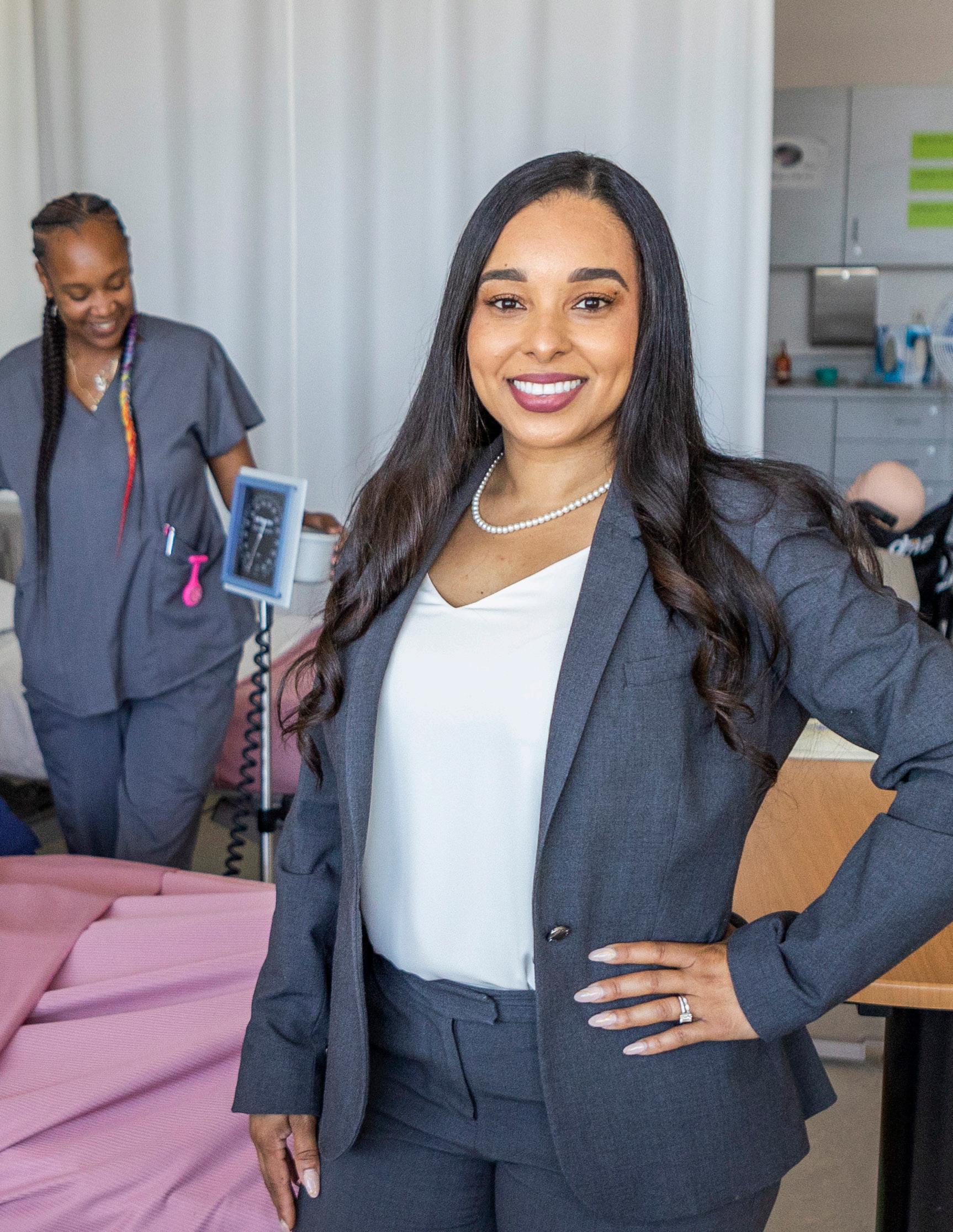














Members of Mesa College’s Pride Center welcome committee show their colorful spirit as they await the opening of the campus’s new gathering spot.
“Community isn’t just something you find, virtually or otherwise,” penned San Diego Miramar College alum Edward Borek in his 2021 short story titled “To Find Community.” “And that’s because, to find community, you have to build community.” And, that is exactly what Borek set out to do during his time as a Jet and now as an employee.


When he enrolled at Miramar College in fall 2020, isolation resulting from the pandemic was very evident in his life. Borek, who had been laid off from his job that summer and was living alone, said that he was desperate to find some sort of community.
“Everyone was feeling the pangs of pandemic loneliness,” he said. Knowing school was continuing on virtually, he decided to reach out to every Miramar College club he could. That is when he met Laura González, a professor and the faculty advisor for the college’s Club Spectrum, a LGBTQ+ student organization, who invited him to a club meet-and-greet event online.
While the first Zoom meeting had many attendees, subsequent encounters became just Borek and another student. So, Borek took it upon himself to help build up the community by promoting the group during other club and student government meetings and creating a website for Club Spectrum.
Eventually, he went on to become the club’s president, as well as the college’s Associated Student Government president and a student representative on the District’s Board of Trustees and Miramar College’s LGBTQ+ Alliance, a student and employee advocacy committee. It was in these positions where Borek was able to further advocate for the LGBTQ+ community, including an added amendment in the ASG constitution to recognize preferred pronouns and increased availability of gender-neutral bathrooms — of which there are currently five at Miramar College and more than 30 districtwide.
“A lot of work had been laid out before me,” he said. “Bringing Club Spectrum, as well as the LGBTQ+














Alliance and the District Queer Alliance into the fold — recognizing them as important stakeholders — was important to me.”
By the time Borek graduated with his associate degree in business administration in spring 2022, Club Spectrum was having regular, well-attended events, including virtual game nights, providing volunteer opportunities at campus food distributions, and participating in community events like the San Diego AIDS Walk and Pride Parade, the latter of which the District has participated in since 2015.
Borek isn’t the only one advocating on behalf of the LGBTQ+ community to make sure the District has available safe and welcoming spaces for this historically underserved population.
In 2017, González, who introduced Borek to Club Spectrum, developed a Safe Zone training program for Miramar College based on programs she attended at other District colleges and online open access training materials. Today, she and District Research and Planning Analyst Jaime Sykes Seiverd together educate faculty, administrators, and classified professionals with a program that provides knowledge about LGBTQ+ language, tools to increase inclusivity in the classroom and in the workplace, and ideas to build a more sensitive environment. While each SDCCD college has its own Safe Zone training process, González and Sykes Seiverd, as well as additional campus employees, including classified professional Anna Liza Manzo, and San Diego Mesa College Pride Center Coordinator Lucio Lira, are working toward standardizing a districtwide program.
Through Safe Zone training, “We want to create an environment in which everyone can be their authentic selves with dignity and respect,” González said. “We want to provide not only education but also practical things that people can do to support the community in
Districtwide programs and initiatives aim to increase awareness and promote inclusion so that all members of the LGBTQ+ community may thrive
their workplace.”
At Miramar College, a list of those who have been Safe Zone trained and consent to having their names listed –approximately 120 to-date – is published on the college’s LGBTQ+ Resources page. Similarly, at Mesa College the Ally/Out List is available as a resource noting those faculty, staff, and administrators who identify themselves as members of the LGBTQ+ community or allies who proudly serve as advocates for respect, inclusivity, and acceptance.
“While I think there is a lot that needs to happen beyond Safe Zone trainings to ensure LGBTQ+ students feel included, supported, and valued for who they are, I think the Safe Zone program is a positive step forward,” Sykes Seiverd said. “It provides committed college employees with the ability to better support their students, knowledge of how to move forward when they make a mistake, and how to see and accept students for who they are and not who they are assumed to be.”
Sykes Seiverd is also one of about 65 people who are part of a statewide coalition working to improve how information is collected from LGBTQ+ students during the CCCApply admission application process. The committee is putting a focus on making questions more accurate and inclusive from a queer perspective, Sykes Seiverd said, which will improve available quantitative data. As the coalition includes members from the California State University and University of California systems, the work being done by the group has implications that extend beyond community colleges, Sykes Seiverd added.
Accurate reporting of LGBTQ+ students, who oftentimes face unique challenges at college, is important in making sure they are provided with necessary spaces and support programs. According to a 2019 National School Climate Survey by GLSEN, 68.7% of LGBTQ+ students have been verbally harassed, 25.7% have been physically harassed, and 11% have been assaulted.
During a 2021 focus group conducted by SDCCD Educational Services, a sense of belonging emerged as a
top priority among LGBTQ+ students. A lack of queer centers on campus, as well as difficulty locating both general and specific resources were cited as being challenges to the success of the students’ educational journeys.
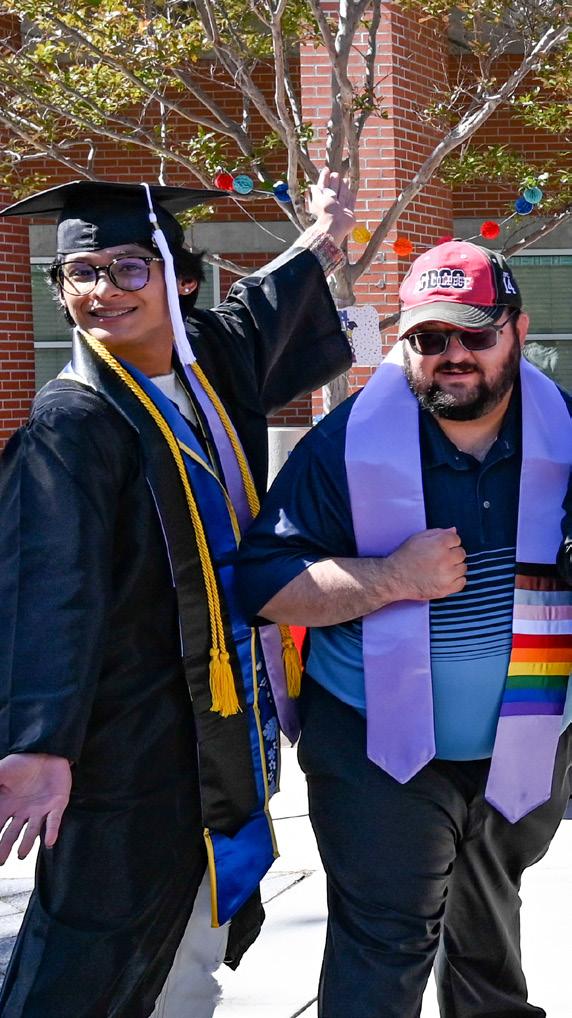
Since the findings were reported, a new Pride Hub for students and employees was opened at San Diego City College to act as “a first stop versus just one stop” for finding a home on campus. Additionally, Mesa College’s new Pride Center will have its grand opening celebration on February 22, and both Miramar and Continuing Education colleges are looking into locations for creating a physical space for LGBTQ+ centers.
“We want students to feel comfortable being themselves coming to the Pride Hub and connecting with folks who understand who they are in terms of their LGBTQ+ identity,” said Adan Sanchez, Ed.D., acting dean of student affairs at City College. “We want students to learn how to navigate the system and advocate for themselves so that they are able to do so in other institutions and with employers.”
The City College Pride Hub was opened in room 207 in the L Building as part of the Intercultural Centers and will share space with the Womxn’s Hub. Now that the District’s campuses are fully open, the next step, according to NextUp Program support technician Ashley Burch, is for students to take ownership of the hub and “feel like it’s theirs to be comfortable in and make it a safe space.”
In 2019, College of Continuing Education launched “Be Well CE” as part of a group of Student Services equity programs, including SDCCEats!, which provides fresh produce and food, that help support the well-being and mental health of students, including those in the LGBTQ+ community. A Safe Zone program also is offered to employees and nearly 200 have completed the training.
While still in development, a center at Continuing Education is being imagined as a place to house a repository for LGBTQ+ resources and support; host workshops, forums, and training; provide a drop-in space for students and employees; and coordinate campus and community outreach programs.
Mesa College student Andrea Ashley said having a LGBTQ+ center on campus is a critical addition to the community college experience.
“For students who feel like they don’t identify with any other club on campus it’s a space they can go, see that flag that represents them and talk about issues facing them,” Ashley said. “Some of the issues they face are very unique to the community, so the issues that I face might not be the same issues that a trans person might face. Having the ability to have that space where you can go and talk about that freely and openly is really important.”
As Miramar College’s Associated Student Government president and a Student Trustee, Edward Borek helped advocate for inclusive policies for LGBTQ+ students throughout the District.
As an active member of Associated Students and Umoja, Ashley also utilizes the student Veterans Center on campus. Through her involvement in these organizations, she said she has learned “we all come from different walks of life. Everyone is different, but we all want to be treated the same.” That is why it was also important for her to become a part of the Mesa Pride Committee and help open the new campus Pride Center.
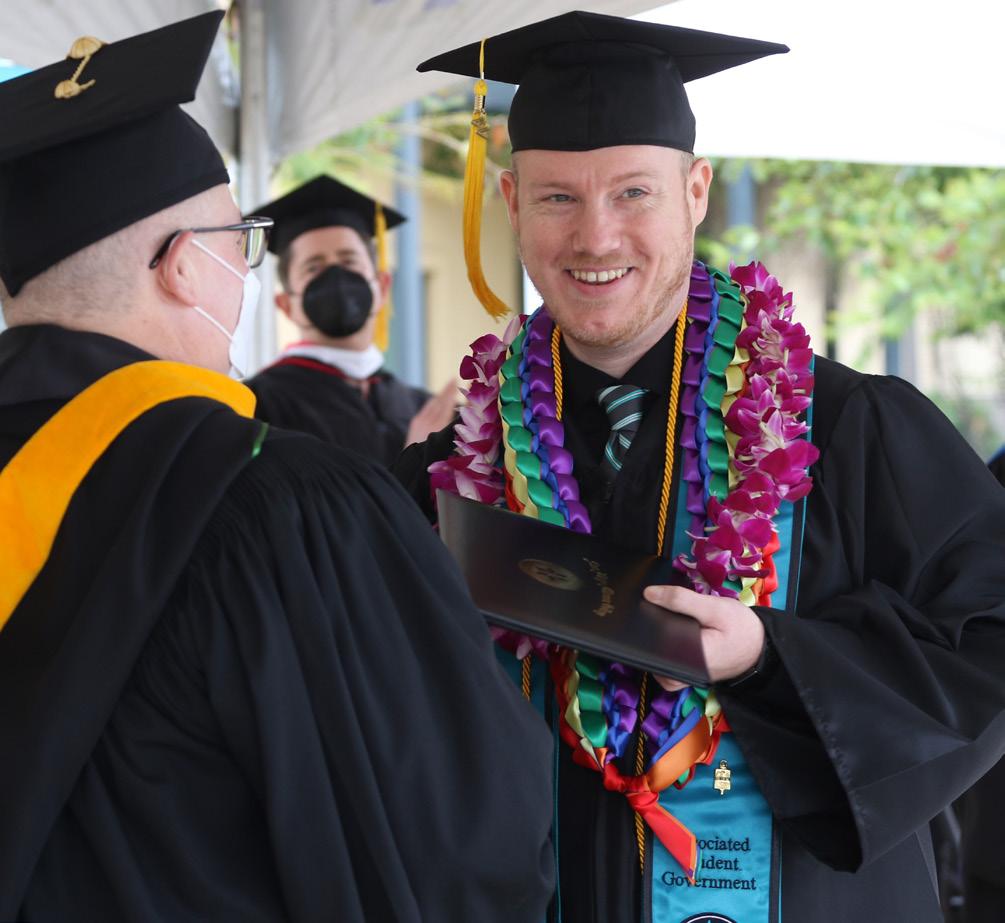
Guadalupe Tovar was taking culinary arts classes at College of Continuing Education eight years ago when she met Jessica Rodriguez — at a carwash, of all places.
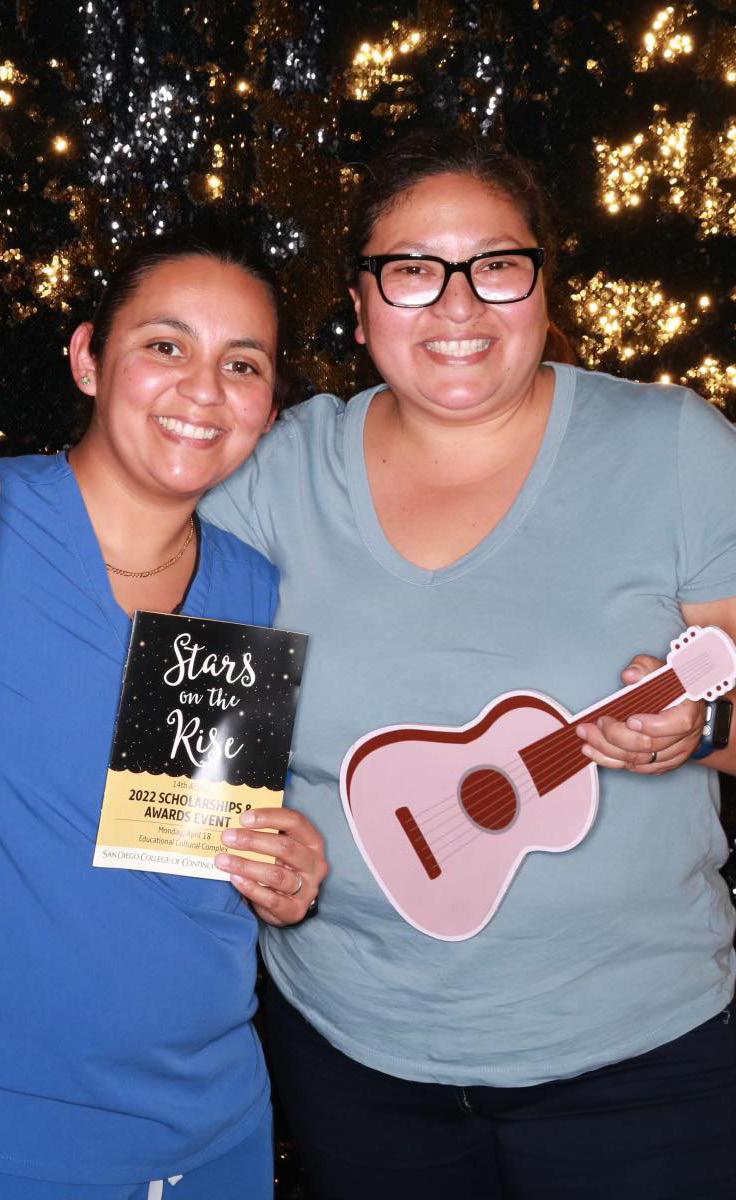
A friendship ensued, followed by a romance, and eventually a marriage.
Like most great relationships, the couple inspired each other to
learn more, pursue passions, and work harder to build a life together. In fact, Guadalupe encouraged Jessica to take high school diploma and automotive classes at SDCCE.
Jessica now works at Grainger Industrial Supply at SDSU while Guadalupe is studying in the certified nursing assistant program at SDCCE to prepare for
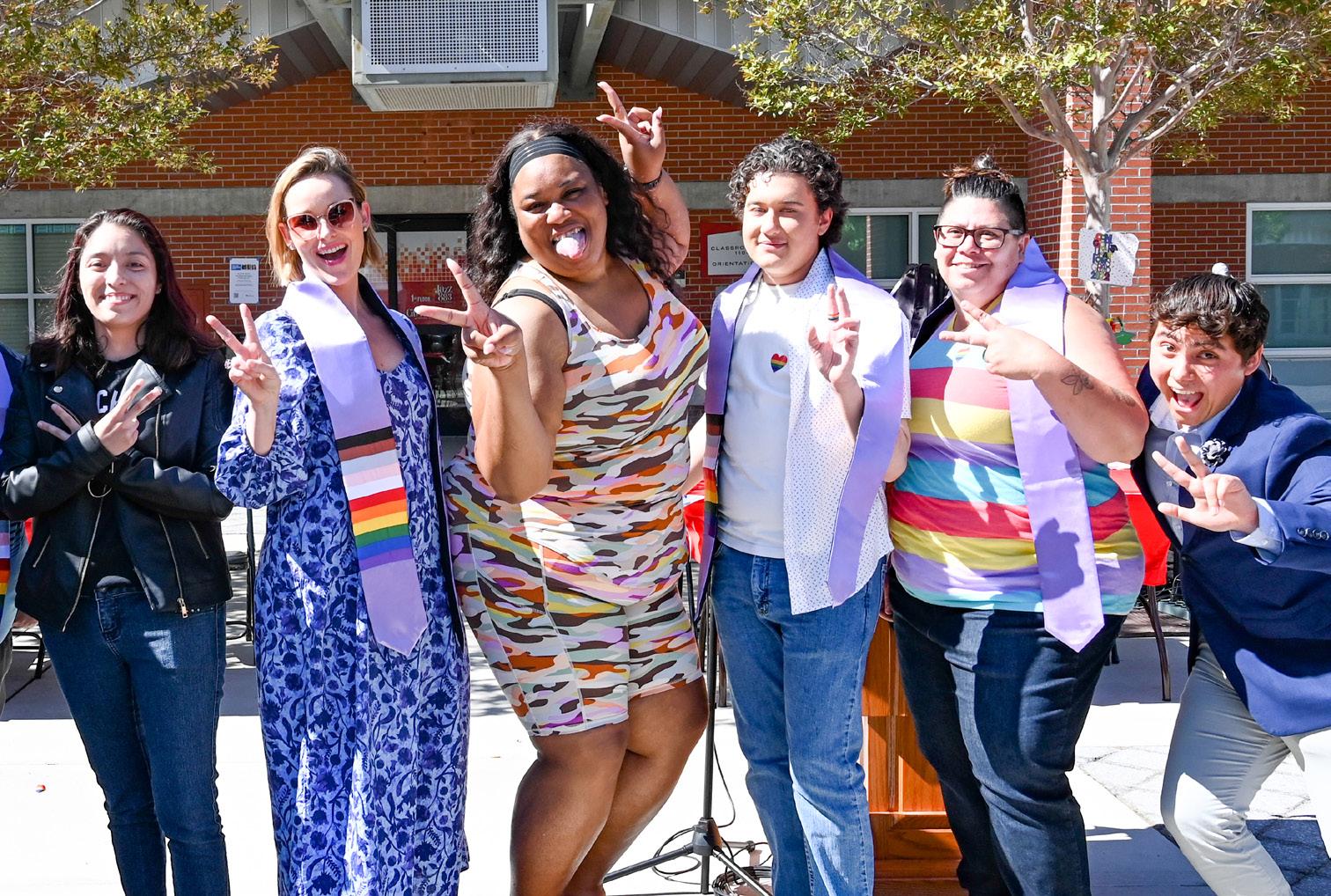
Walk around the District’s colleges and you’ll find colorful rainbow banners celebrating “Pride” a symbol that all are welcome.
For Mesa College alum Lance Nelson, the thought of stepping foot on a new college campus at the age of 30 was immobilizing. But, it was a colorful banner that assured him he belonged there.
“I finally began walking to class and the first thing I see is this big rainbow banner with the words ‘Mesa Pride.’ I figured I could do this,” Nelson said.
In addition to the soon-to-open Pride Center on campus, during the fall semester Mesa College held a student-curated exhibition titled “Pride and Protest: A Celebration of LGBTQ+ Love and Activism” at its Art Gallery that included the artwork of 25 artists celebrating the beauty and creativity that blossoms with self-discovery and acceptance.
For City College alum Rocky Dove, it was because of such personalized messages and events that he felt a sense of community during the short time he was on campus through the pandemic.
“I grew as a person, not only academically, where I realized more of what I was interested in and wanted to study, but also because I learned how to put myself out there, how to seek out resources, and that it’s OK to ask people for help,” he said. “I learned the value of doing that as a result of going to City College.”
Dove specifically cited Burch and Counselor Selam Gebrekristos as being invaluable to keeping him on track and helping him transfer to University of California San Diego, where he is studying philosophy and cognitive science.
Before transferring this fall, Dove also left his mark on City College. He helped advocate and pave the way for the college to establish its own Pride Hub, and, along with a handful of other students, participated in City College’s inaugural Lavender Graduation, where he was the introductory speaker.
“It’s an important priority to have a space dedicated to LGBTQ+ students,” he said. “I was very happy that I could have a role in helping this community.”

a career as a licensed vocational nurse in pediatrics. She currently works at Rady Children’s Hospital.
For Guadalupe and Jessica, the encouragement they got from each other and during their time at SDCCE led to career paths where the sky is the limit.
“Continuing Education has given me the opportunity to build a
better future for myself and my family,” Guadalupe said. “I was at a point in my life where I needed a change in career, and even though I wanted to go to school, financially it had been difficult until I heard about the programs being offered for free at the (Educational Cultural Complex) and decided to give it a try.”
Career education programs at the San Diego Community College District’s four colleges change lives and provide the foundation for a rewarding career. Just ask Frank Hernandez, Bianca McLaughlin, Kevin Croan, or Sarah McKee.
The four students profiled here are among the more than 34,000 students taking a wide variety of credit or non-credit career education courses at San Diego City, Mesa, Miramar, or Continuing Education colleges. These alumni found their passion and are now working in a field that they love.
Moreover, 98% of the colleges’ students stay in San Diego after their graduation. Which means, career education alums supply local employers with the workers they need to make their businesses more productive.
A recent study found that career education programs benefit both students and the San Diego region. The study found that career education programs within the SDCCD have a $1.6 billion economic impact, ranging from the higher-paying jobs that alumni now are working to the employees and services that the District utilizes.
The study also found that the
money that students invest in their education is a far better deal than the stock market. For every dollar that a student invests in their career education program at the District’s colleges, they will have a return of $6.20 in increased lifetime earnings — an annual rate of return at 23.5%.
There are few better investments that a student can make than a career education program within the SDCCD. These are four success stories among thousands.
Frank Hernandez started out taking some accounting courses at City College in 2016 to help him learn how to run a business. He ended up earning three certificates that led to him setting up his own accounting and tax preparation company, Traxx Accounting.

“I saw a catalog with some accounting classes, and I thought they would help me out,” Hernandez said. “I
took the classes and it clicked. I was in love with it.”
Hernandez, a child of Mexican immigrants, grew up in poverty. After graduating from high school, he decided to attend City College because it was nearby and he liked the diversity.
Hernandez earned certificates in payroll and tax preparation from City College and now is licensed by the state of California and the Internal Revenue Service. While still in school, he began volunteering with multiple organizations to help students and community members prepare their taxes. That led to a job with nonprofit organization Home Start to help those in need with their tax preparation.
“It was honestly one of the best experiences I’ve ever had,” Hernandez said. “Other companies charge a lot and some people can’t afford it. Being able to do it for free helped them out. It made them smile and they were so
Certificates: Business studies-small business accounting; VITA tax preparation training; tax preparer; and record keeping for a small business
Current company: Self-employed, Traxx Accounting
Current job title: Owner, Accountant
SDCCD
Accounting (Accountants and auditors)
Median salary: $79,257
Average annual openings: 1,329
Interior Design (Interior designers)
Median salary: $60,846
Average annual openings: 132
Diesel Technician (Bus and truck mechanics and diesel engine specialists)
Median salary: $60,658
Average annual openings: 227
Welding (Welders, cutters, solderers, and brazers)
Median salary: $49,525
Average annual openings: 424
Information about median salary and average annual openings is based on data collected for San Diego County by the Centers of Excellence for Labor Market Research.
grateful.”
The Accounting department at City College offers certificates and an associate degree in accounting and financial management. The areas of emphasis include tax and certified public accounting preparation, financial management, and fundamentals in accounting. The coursework is designed to prepare students for transfer to a four-year university and provide the skills needed to obtain entry-level positions and prepare for the Certified Public Accountant (CPA) and Certified Management Accountant (CMA) license.
Hernandez said the Accounting department had excellent instructors, and he especially praised Shana Carr, an accounting professor and current acting dean of the School of Business, Information Technology, Cosmetology, Engineering & Trades.
“She was definitely a big influence,” Hernandez said. “I’ve shown my dedication and my eagerness to learn. I was hungry, and she saw it in me.”
After becoming licensed in 2017, this year Hernandez opened his own business in downtown San Diego. In addition to his regular workload, he hopes to continue volunteering his services to help others improve their financial literacy so they know how to handle their money.
“I always believe in giving back,” Hernandez said. “I wasn’t raised with a lot of money, and I learned from ground zero on how to survive. Every chance I get, I want to give back. It’s important to me.”
As to the future, Hernandez said he would
ultimately like to go to law school and become a forensic accountant. Although, after interviewing with the Internal Revenue Service during the pandemic, he wouldn’t rule out a position with the government.
Bianca McLaughlin found her dream job working in interior design — even before she finished her courses in the program at Mesa College.

While a Mesa College student, McLaughlin was selected for an eight-week internship at Ryan Young Interiors in summer 2021. At the end of the internship, possible future jobs were discussed during her exit interview. She thought she might hear from them months later as she continued taking classes toward her associate degree.
“About a week and a half later, I got a phone call that they wanted to offer me a position,” McLaughlin said.
She has worked as a commercial designer for the company for the past year and plans to complete her associate degree in interior design in May. McLaughlin said the excellent education she continues to receive from Mesa College prepared her well for her career.
“Interior design is not like what you see on HGTV. It’s much more technical than that,” she said. “I think that Mesa does an incredible job. They prepared us technically.”
The Interior Design program at Mesa College prepares students for Interior Design certification and a career in
Mesa College
Degree: Associate of science degree in interior design (expected date of completion, May 2023)
Current company: Ryan Young Interiors
Current job title: Commercial Interior Designer
the field. Students learn how to create unique design solutions, using both hand-drawing and hand-drafting and industry-standard software such as computer-aided design (CAD) and 3-D modeling.
McLaughlin grew up in San Diego, but her family moved to the Czech Republic when she was 15. She said she always loved interior design, but she was unable to find an English-language program at a university in Europe. She decided to return to San Diego for her schooling.
She initially entered the web development program at Mesa College in 2017 because of her stepfather’s concerns that interior design was not a practical career. McLaughlin was nearing completion of the program but knew that it was not her passion. So, she signed up for an interior design class.
“I decided to take a class to see if I liked it, and I loved it,” she said, which she launched her transition into taking interior design classes in 2019. “When I took my first class, I was on the verge of tears. I knew it immediately.”
McLaughlin said her job is even better than she expected. She designs for multifamily homes and high-rise buildings and manages the library of fabrics and furniture for the company. Her love of interior design is even deeper now.
“It’s about how we live in a space,” she said. “It’s so interesting to me that what we do within our space creates happiness for us and a sense of peace. Providing that for people is really fascinating.”
And, by the way, after seeing firsthand the
intricacies involved in home and interior design during a recent remodel of her parents’ home, McLaughlin’s “cautious and practical” stepfather now better understands her choice in careers.
Kevin Croan was trying to figure out what to do with his life after he realized a career as a math teacher was not for him. He discovered a new career as a diesel technician through the classes he took at Miramar College’s diesel technology program.
Croan, a Marine Corps veteran, had earned a bachelor’s degree in mathematics with single-subject teaching emphasis in 2015 and was in graduate school when he started an internship teaching math at a middle school.
“As soon as I got into the internship, I hated it,” he said. “School had changed. I didn’t even finish the graduate program.”
He liked working on automobiles and felt he could have a lucrative career as a diesel technician. In 2018 he decided to attend Miramar College after he called the program and Professor Gene Choe answered the phone.
“It made me want to join right away,” Croan said. “He took the time out of his day to tell me about the program.”
The Diesel Technology program at Miramar College has a two-year curriculum with three tracks that lead to a certificate, and two tracks leading to an associate degree. Students can master the skills required for success in servicing and maintaining heavy-duty commercial trucks,
off-highway heavy equipment, stationery engines, and marine craft.
Croan said the program provided excellent instruction to learn the field.
“It was a lot of hands-on experience,” he said. “Everything that they taught us theory-wise we were able to practice in the laboratory. The instructors were there to offer assistance if you needed help to increase your technique.”
In 2019, while in the program, Croan and his peer Valentino Nevarez were among five students sponsored by FedEx to compete in the American Trucking Association (ATA) and Truck Maintenance Council (TMC) Futuretech event in Raleigh, North Carolina. After the competition, both got calls from FedEx offering them jobs, and both continue to be employed there.
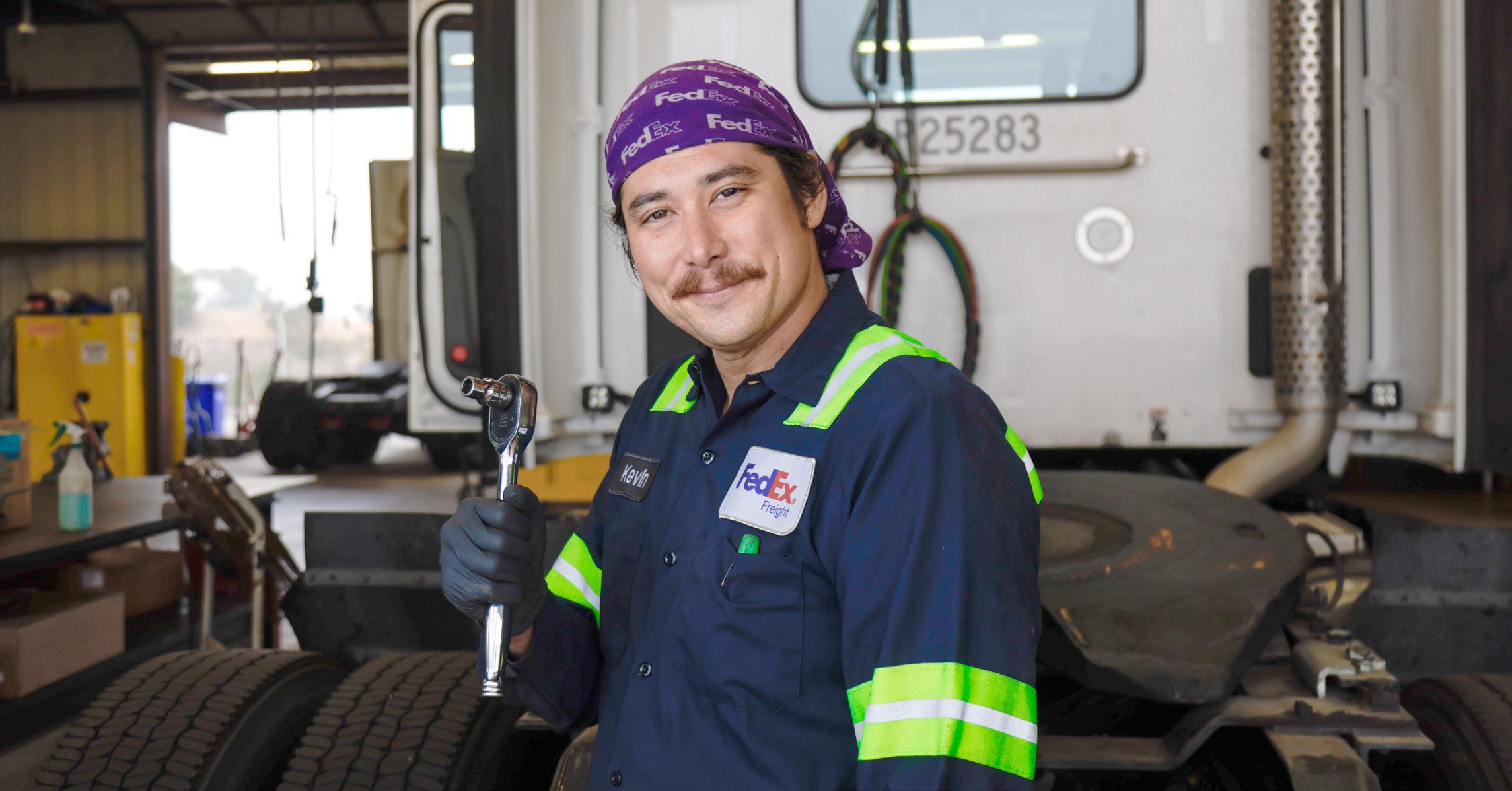
Croan said he finds the work to be immensely satisfying.
“When you fix stuff and you see that truck rolling out, you know you’re making a difference,” he said. “I’m increasing my knowledge on a daily basis and learning more about the equipment. The more knowledge you have the better technician you are.”
Despite his new career, Croan still felt the pull of the classroom. This fall, he began teaching three courses for Miramar College’s diesel technology program — including math and measuring. He ended up becoming a math teacher after all.
“I get to teach math and use mathematical terms,” he said. “I get all excited and jittery. I’m good at teaching math. I get to shine.”
College of Continuing Education
Certificates:
Shielded Metal Arc Welding and Flux-Cored Arc Welding (FCAW)
Current company: Chromalloy
Current job title: Welder
Sarah McKee took a winding career path to her current job as a welder. She was a theater hand, a math teacher, and was studying to become an actuary — until she heard about the welding program at San Diego College of Continuing Education.
McKee had done some welding while she worked as stage manager and assistant technical director for the Kingsmen Shakespeare Company in Thousand Oaks. But after earning her bachelor’s degree in theater and math from California Lutheran University, McKee had moved on to be a high school and middle school math teacher. After three years, she realized she no longer wanted to be a teacher.
“It was such a hard decision,” she said. “I had put so much of my life into that.”
She thought about using her math skills as an actuary, calculating insurance risks and premiums. Then she saw a mailer about Continuing Education’s welding program, which is offered at no cost at the college’s Educational Cultural Complex in Mountain View and provides students with certificates from the American Welding Society after they complete 600 hours of study. In the program, students can expect to learn a series of welding practices as well as math, communications, and business.
“I wanted to learn more about welding,” McKee said. “I signed up, and I fell in love with it.”
After starting the program in fall 2020 — at a time when the class was remote before being allowed on campus for hands-on work later that year — McKee said she particularly bonded with the other women in the welding classes. They created a women welders group and supported each other through the program.
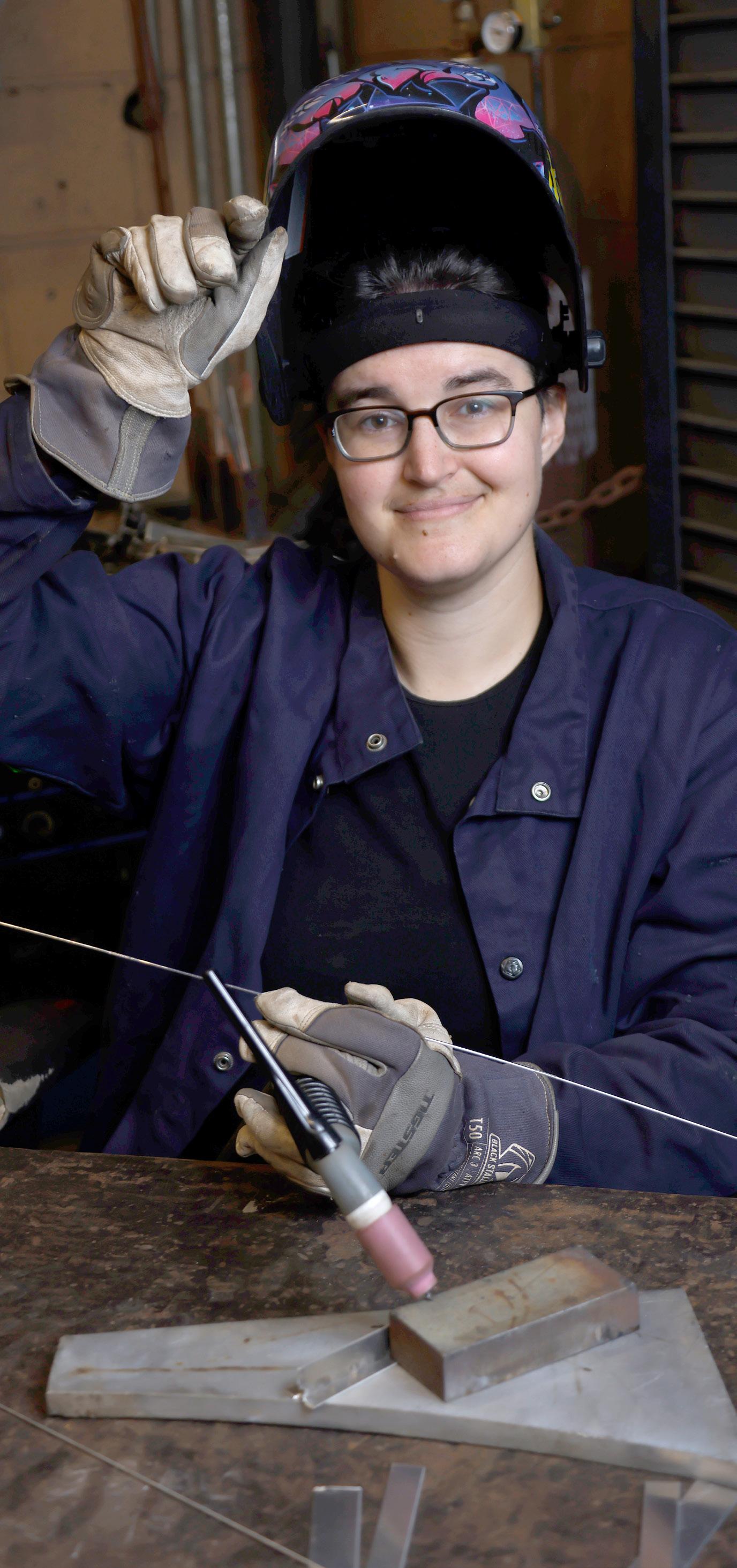
She was able to use her teaching skills in one class called Math for Welders.
“I would host homework nights,” she said. “I had been used to teaching kids. Everyone brought their own paper and pencils. I thought, ‘These are the best students I’ve ever had.’ ”
She got her first welding job while she was still in the program, which she completed in August. With a recommendation from instructor Bob Pyle, McKee was hired in October for a full-time job as a welder with Chromalloy, a San Diego aircraft manufacturing company.
McKee said she got all the training she needed to be a good welder, along with the people skills necessary for a job.
“I really did appreciate how much they instilled in us the idea that they send people off with welding skills, but the people who get and keep jobs are the ones with good working skills,” she said.
I really did appreciate how much they instilled in us the idea that they send people off with welding skills, but the people who get and keep jobs are the ones with good working skills.”
“
— Sarah McKee, College of Continuing Education alumna
Atthe age of 26, Dan Rios signed up for a photography class after he was told to take on a hobby while studying to become a civil engineer. That recommendation eventually led Rios to San Diego City College (then San Diego Junior College) commercial photography instructor William “Bill” Dendle, who also offered up some advice that would stick with Rios: Never throw away the negatives from his photos.
“Out of all the property I would accrue over my lifetime, Bill told me that nothing was more sacred than my negatives,” Rios said. “It represents the most important work you’ll ever accomplish as a photographer.”
And, though he never intended to become a photographer, Rios, who lives in Escondido, said: “I fell in love with the discovery and magic of it all. I’d go through 100 feet of film in a week. Developing the film, processing it all in a darkroom — it was a wondrous adventure for me.”
Throughout his storied career as a photojournalist, Rios, 83, amassed 1 million negatives, which he donated to California State University San Marcos in 2020.
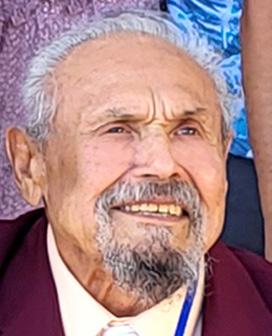
At the time of his enrollment in City College in the late 1960s, Rios said it was the only local school that offered courses in commercial and industrial photography. And lucky for him, since that was where he would meet Dendle, whom he credits as one of his biggest influences.
“Bill went over and above the classroom curriculum to challenge me as a photographer,” said Rios. “He took me under his wing. He even got me my first job as an assistant photographer.”
Dendle, who was a photography instructor at City College for 19 years, would often give Rios difficult and unique assignments that forced him to step outside of the box as a photographer, and told Rios that if he learned to become versatile in the objects he photographed, he would succeed as a professional photographer.
“He had a bookcase that was 8 feet tall and 20 feet wide full of photography manuals and books,” Rios said. “If I had a question, he’d tell me to go to that bookcase to find the answer. He told me that I’d figure out the answer. He’d always challenge me.”
Rios did more than just succeed as a professional photographer. He went on to work for the Escondido Times-Advocate and North County Times newspapers in Escondido where he photographed major events, police scenes, fires, and San Diegans for more than three decades.
“I never left Escondido because I loved the people, the town, and the newspaper,” Rios said.
He also loved his job as a photographer. He led the photography department at Escondido Times-Advocate where he developed a system for color separations in the darkroom. That allowed the newspaper, which previously only printed in black and white, to print photos in color.
And, through it all, Rios saved all of his negatives. When he learned the newspapers would dispose of them, he took them home in 1977, and saved them in his Escondido garage. Boxes and boxes of negatives piled up in his garage, he said, until a colleague told Rios she would find a home for the negatives, which eventually led to University Library Special Collections at California State University San Marcos.
After the university sent a truck to pick up the boxes, they discovered Rios had collected nearly 1 million negatives. The collection from Rios also includes prints, slides and other documents.
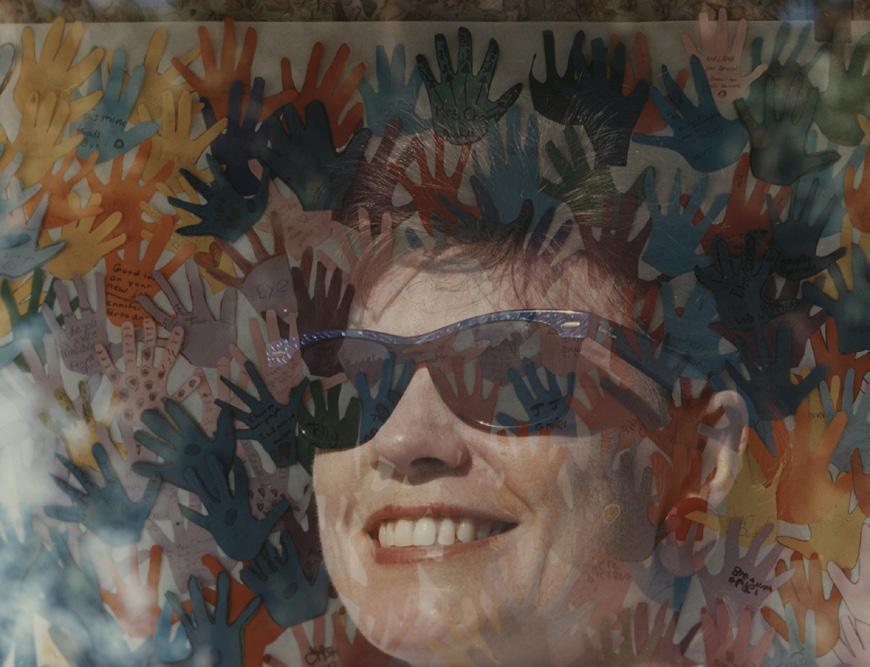
“I was floored when they told me there were 1 million negatives,” Rios said. “I’m really happy they found a home at the university, and the university seems really happy to have the collection.”
Looking back on his career, Rios said his most prized photos are those that include people. He can’t narrow down one, single photo that stands out to him the most, but he remembers the people he met over the years.
“I’ve always enjoyed meeting new people and taking their picture,” Rios said. “I took pictures of them all — world leaders, politicians, and celebrities. I just loved the people.”
Rios said he also recognizes the impact City College had on his life. Had he not signed up for a commercial and industrial photography class with Dendle, his career may have looked very different.
“My curiosity inspired my love for photography, but Bill Dendle taught me the craft,” Rios said. “He took an interest in me and showed me the magic, and I really appreciate it.”
When asked what one photo stands out in his career, photographer Dan Rios said there isn’t just one, but what does stand out is the people he met.
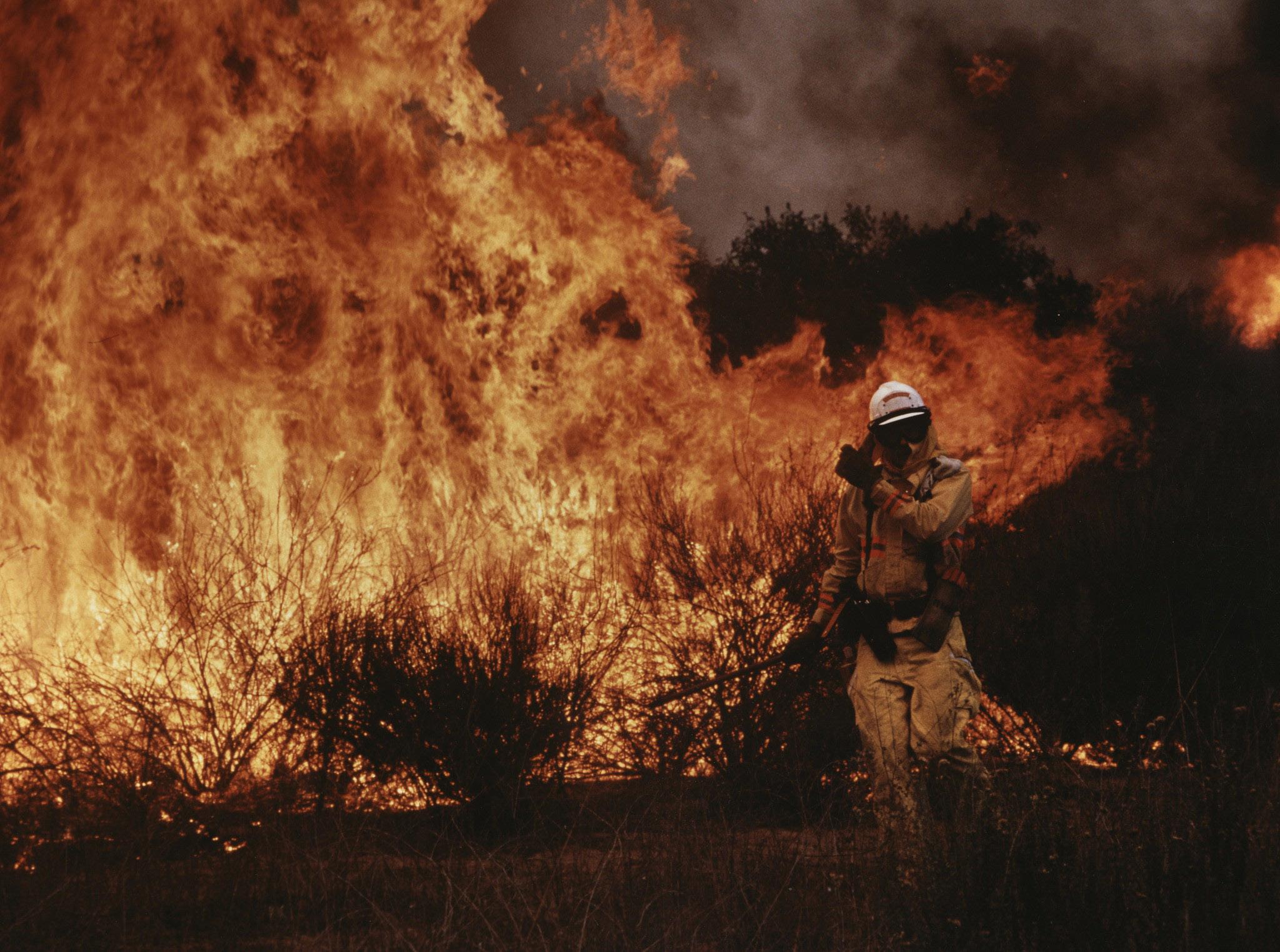




When you look at the opening scene of “Pirates of the Caribbean,” you might notice the sea, the not-so-magnificent vessel, or the movie star at the helm.
Mike Espar, though, takes note of the music and its dramatic, and sometimes unexpected, effect on what the viewer sees and feels.
That is because the associate professor blends his own first love, music, with another of his interests, film and television — the latter a product of his parents’ influence. Both have shaped his approach to teaching students about songs and how they weigh on the viewer’s experience.
Espar, who co-directs the City College Music Program while also leading the World Cultures Program, calls film and television “always kind of the family business,” but said “music was always my true passion.”
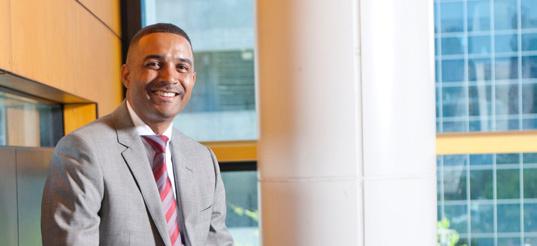
“Combining the two, I felt, was kind of my niche,” he said.
Initially, though, after graduating from Yale University, he focused on the visuals, working with production companies such as HBO and Nickelodeon. But more and more, Espar found himself drawn to composers on his productions. It made him realize, “This is the person who has the most exciting job on the whole project. I want to do what he is doing.”
With that in mind, he returned to school, attending New York University for graduate studies in music composition and scoring.
It’s not just about the music for Espar – technology and psychology feed into the mix, as well.
For instance, as a youngster growing up in Palo Alto, he learned that by using recording software he could “be a whole band by myself” if friends couldn’t make it to jam with him. Then, in college, psychology courses helped him see the opportunity to draw an emotional response from viewers.
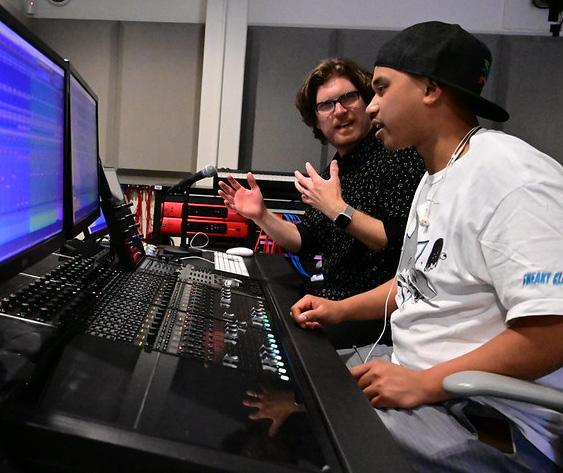
The approach has served him on a range of projects. His music has been featured in productions that aired on truTV and HBO, others that screened at prominent film festivals, including Sundance, and in commercials for clients such as Fruit of the Loom and Levi’s.
He also embraced teaching while on the East Coast,
starting out as an adjunct at City University of New York before looking for the opportunity not only to teach full time, but also to move back to California.

His varied career path and approach to music can serve as an example to students, whether they are interested in composing their own works, creating sound design for productions or even scoring video games, he said. He and Music program co-director Bob Kostlan also have re-shaped the program’s degree curriculum. It now will include courses not only on music and recording technology, but also about music marketing and entrepreneurship to better prepare students for the industry.
“I’m always trying to encourage students to draw on past experiences,” he said. “There’s no single path to be where you want to be in the music industry.”
“I’m always trying to encourage students to draw on past experiences. There’s no single path to be where you want to be in the music industry.”
— Mike Espar, co-director of the City College Music Program
Thanks to its participation in the Generation Hope FamilyU, Mesa College will grow its support of students who are parenting while in college.


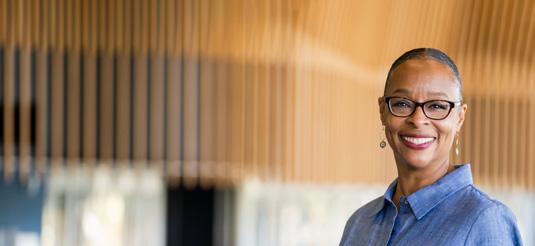
San Diego Mesa College has been included in the second cohort of higher education institutions participating in the Generation Hope FamilyU technical assistance program. Through FamilyU, Generation Hope partners such as Mesa College will be able to increase and support students who are
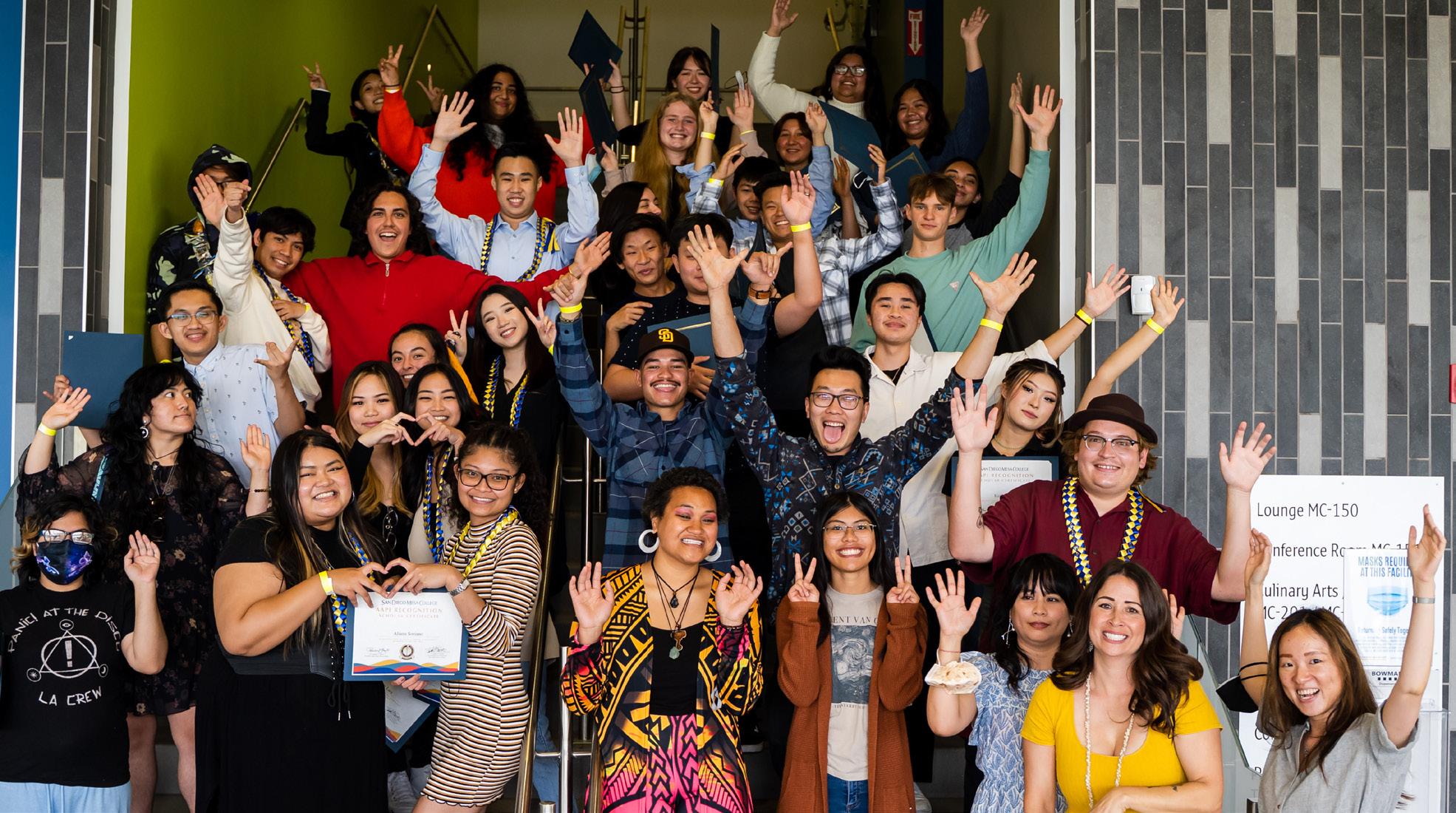
parenting while in college, so they can complete their programs and graduate. Parenting students account for one in five undergraduate college students nationwide; a population whose odds of college completion are far lower. Despite having higher GPAs than students without children, parenting students are 10 times less likely to graduate due to inadequate support systems. Mesa College was chosen in part due to having an existing supportive and dedicated team that can initiate and implement strategies to better serve our student parents, along with the readiness to engage in interventions
designed to build and refine institutional competencies to improve student parent success. Mesa College is currently gathering information from students about their respective needs and will implement supportive activities in the coming year.
In fall 2021, Mesa College was awarded an Asian American and Native American Pacific Islander Serving Institution (AANAPISI) Title III, Part F grant titled “Equity, Empathy, & Excellence: Uplifting and Transforming Campus Culture through a Kapwa Lens” by the United States Department of Education. This five-year, $1.5 million grant will ensure services and resources are available to the Asian American Pacific Islander (AAPI) student population to promote academic success and strengthen institutional capacity. Mesa College became the first community college in the region to receive the designation. The purpose of AANAPISI designation is to provide Mesa College the opportunity to improve the academic attainment of Asian American Pacific Islander, Native Hawaiian, or similar identities, and low-income students. Being an AANAPISI means Mesa College can be a greater reflection of its students, their cultures, values, and life experiences. It is the belief at Mesa College that all students deserve to feel connected and safe on campus and have access to programs and services to help them successfully reach their goals.

Miramar College basketball player Cameron Barry has quite the college athletic experience to share — one that saw him complete 30 units during the spring 2022 semester and obtain two degrees from two different colleges at the same time.
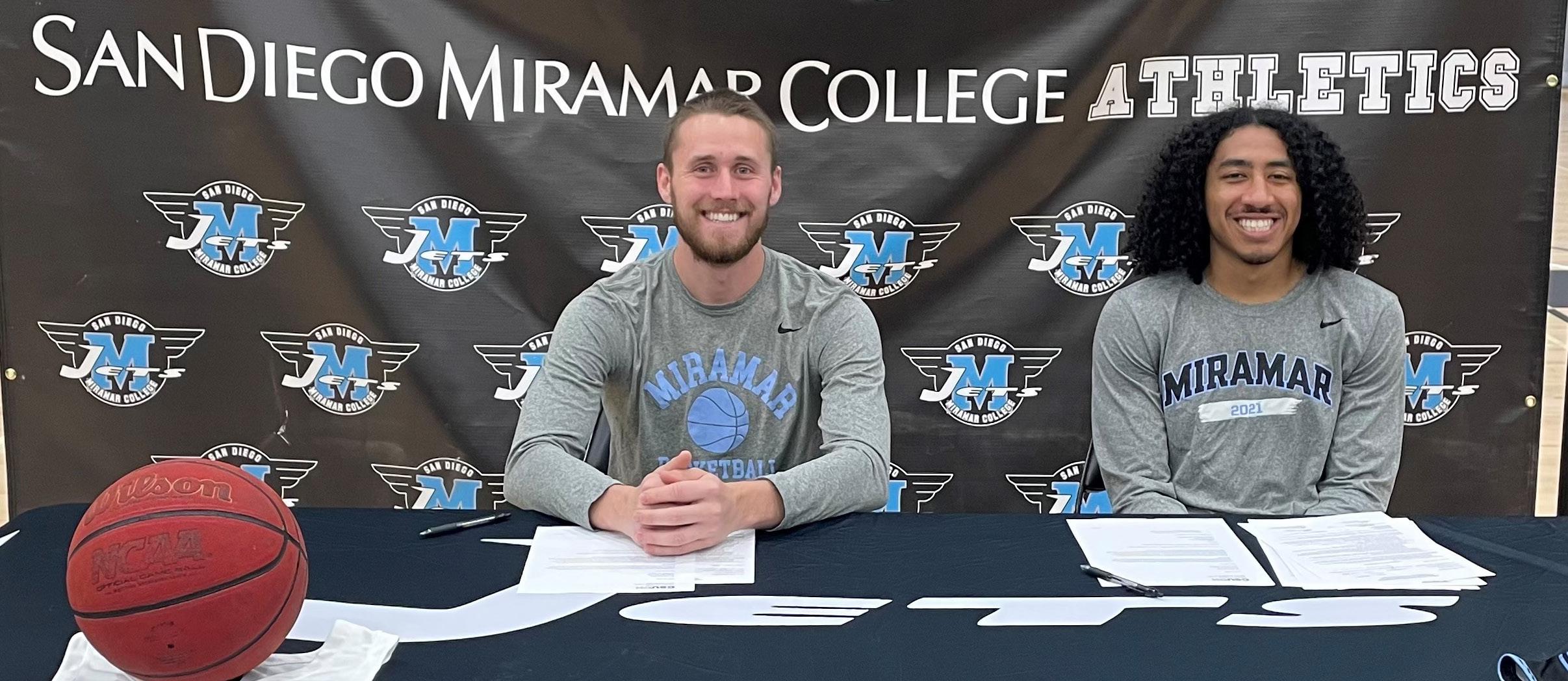
Also in May, as the result of his 4.0 grade point average, the 2022 Pacific Coast Athletic Conference named Barry Student Athlete of the Year.
Barry dazzled on the court, where the Jets guard was a two-time All-PCAC selection. He leaves Miramar College as the school’s second all-time leading scorer, the career three-point leader, and holding the record for the most three-pointers in a game with 11.
But perhaps most impressive was that while playing for Miramar College, he also was enrolled at San Diego State University where he completed his BA in business finance this past summer.
How did all this happen?
Barry graduated high school in spring 2018. Not wanting to lose his enrollment status at SDSU, he enrolled in the fall 2018 semester at SDSU on a part-time basis. His intention was to walk-on to the Aztecs basketball team.
But, Barry realized he’d rather play than sit the bench as a walk-on and therefore he also enrolled at Miramar College. To maintain his college basketball eligibility, Barry decided to gray-shirt.
The NCAA eligibility clock for a student athlete begins the moment they take 12 or more units during a semester. So, the concept of “gray-shirting” is designed for students to postpone their full-time enrollment status until the second term of freshman year. The NCAA allows college athletes five years to complete four years of eligibility after initial enrollment.
NCAA eligibility also loosened during the COVID-19 pandemic, allowing an athlete to extend their eligibility. To further confound matters, the
2020-2021 California Community College Athletic Association (CCCAA) basketball season was cancelled and all student athletes had their eligibility paused. This meant that Barry could keep playing for the Jets while attending SDSU and still maintain enough eligibility to play at a four-year university.
Got it? To say it’s complicated is an understatement.
Barry put a high level of confidence in the counselors, compliance officers, and the NCAA Clearinghouse to help him deal with it all.
How did he balance it all, you might ask? It wasn’t easy.
“It was all about time management,” said Barry. “At San Diego State they allow you to take up to four leaves of absences, so I strategically took two of them during my basketball seasons.”
Barry also lived smack in the middle of the SDSU and Miramar College campuses.
This past spring, he completed his 12 units at Miramar College to remain eligible while completing an additional 18 units simultaneously at SDSU.
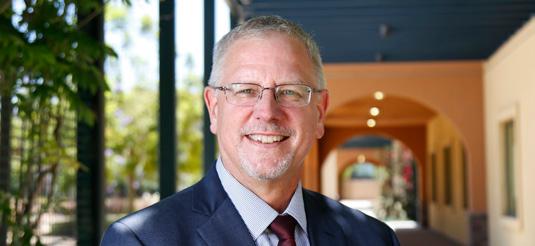
“Thirty units in one semester was challenging,” said Barry. “My first year, I would come to Miramar for practice in the morning, then drive to SDSU for classes from noon to two, and then come back to Miramar in the afternoon for more classes. I did that 4 days a week. Then COVID came and everything went online and the struggle to get to campus was no longer an issue.”
Barry is not done yet. He signed to play college basketball at California State University Dominguez Hills where he will have two more years of eligibility.
“He is a phenomenal human being,” said Nick Gehler, Miramar College head basketball coach and athletic director. “It was amazing to see him work so hard for us, both on the court and in the classroom, and then realize he was also a student at SDSU. Truly amazing accomplishment.”
Nearly half of the student body of San Diego College of Continuing Education will have a new support system thanks to the launch of the Immigrant-Based Support Program (ISP) Student Center at the César E. Chávez Campus in Barrio Logan. The center, which opened this fall, will help students who are immigrants, refugees, and English language learners.

“I saw the need to provide a safe on-campus space for these students,” said ISP Counselor and Coordinator Sheyla Castillo. “I wanted more than anything to surround our students with a community that could support them in navigating the American school system — without fear of deportation — so that they could believe in themselves and aspire to become who they want to be.”
ISP is a virtual student support program with an on-campus site designed for adult students who are immigrants, refugees, and English language learners. ISP hosts weekly community forum presentations in Spanish and English. The program has two WhatsApp group chats, one in Spanish and one in English, where students share resources with one another such as job announcements, free food distribution locations, educational opportunities, low-cost laptops, and community events. Additionally, ISP offers student referrals for free or low-cost health and legal assistance and coordinates peer-to-peer study groups.
As an immigrant from Ecuador whose doctoral studies are in international education, Castillo understands firsthand the needs of immigrant students, refugees, English language learners, and foreign-born professionals who enroll at the College of Continuing
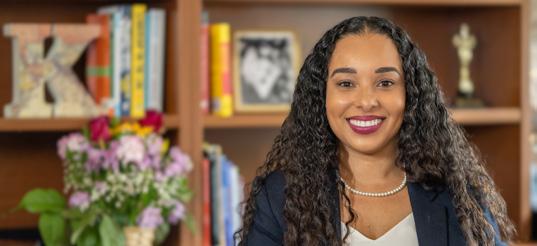
Education to create or rebuild their lives in the United States. Castillo also advocated for the college to provide students with a High School Diploma/Equivalency program in Spanish in 2006 and later started the ISP program in 2019.
The ISP is helping English as a Second Language student Isabella Andrzejczyk, who came to the United States from Germany when her husband got a new job in La Jolla. Andrzejczyk worked as a television production manager for 17 years in Germany and wanted to gain new skills in the U.S., including improving her English language comprehension.
“ISP has many helpful resources,” Andrzejczyk said. “The program allowed me to get to know my ESL teachers more personally during the community forum presentations.”
Andrzejczyk recently completed the project management certificate program through the College of Continuing Education and works as an ESL project assistant.
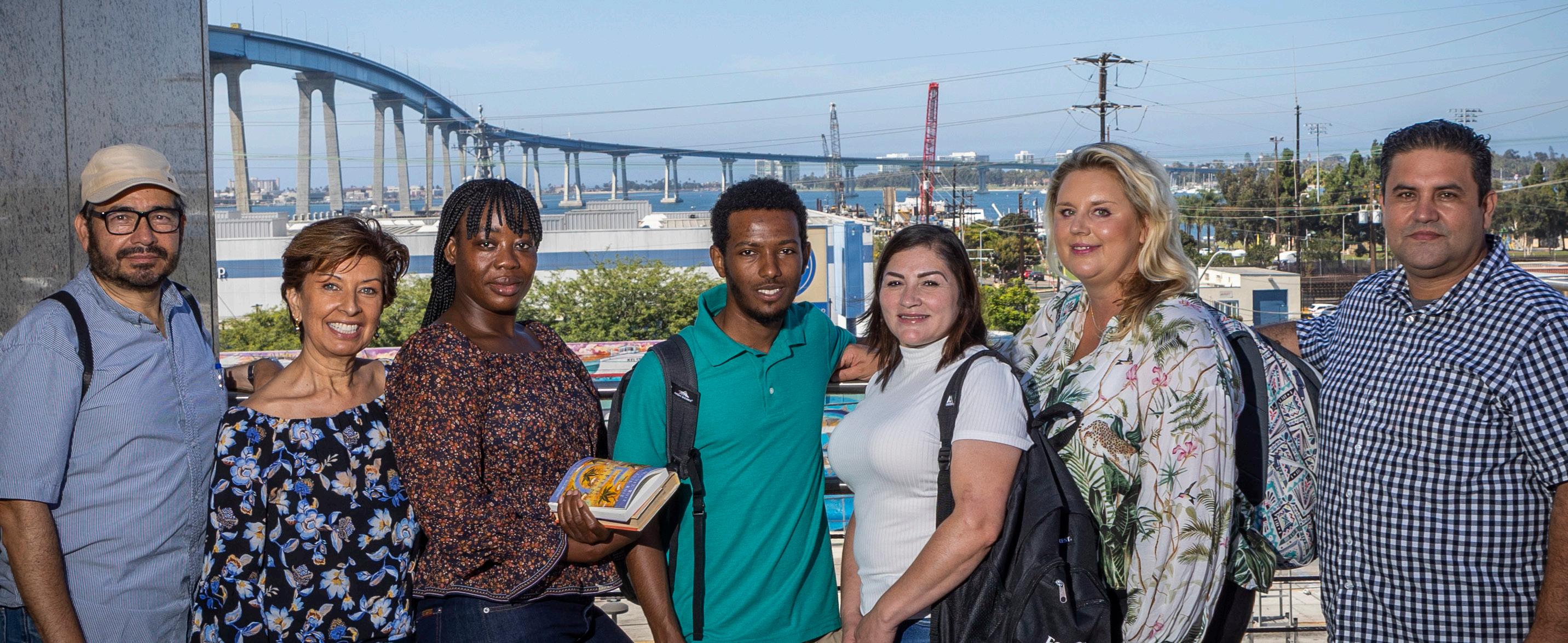
“The College of Continuing Education showed me that I could study full-time, work part-time, and spend a lot of time with my daughter,” she said. “I did not know this was possible in another country.”
In addition to providing a safe space and important resources, ISP serves as a critical pathway to the San Diego Promise by assisting students to apply for the scholarship and grant program, which allows students to attend San Diego City, Mesa, and Miramar colleges tuition-free. More than 50 ISP students have transitioned from College of Continuing Education to a SDCCD credit college in the past three years.
This year, Julia Kogan became the first to serve as a student trustee representative for San Diego College of Continuing Education on the San Diego Community College District Board of Trustees. Through the advocacy of her peers at the District’s credit colleges - San Diego City, Mesa, and Miramar colleges - a fourth representing student trustee member was added by the Board of Trustees to provide a voice for noncredit college students.
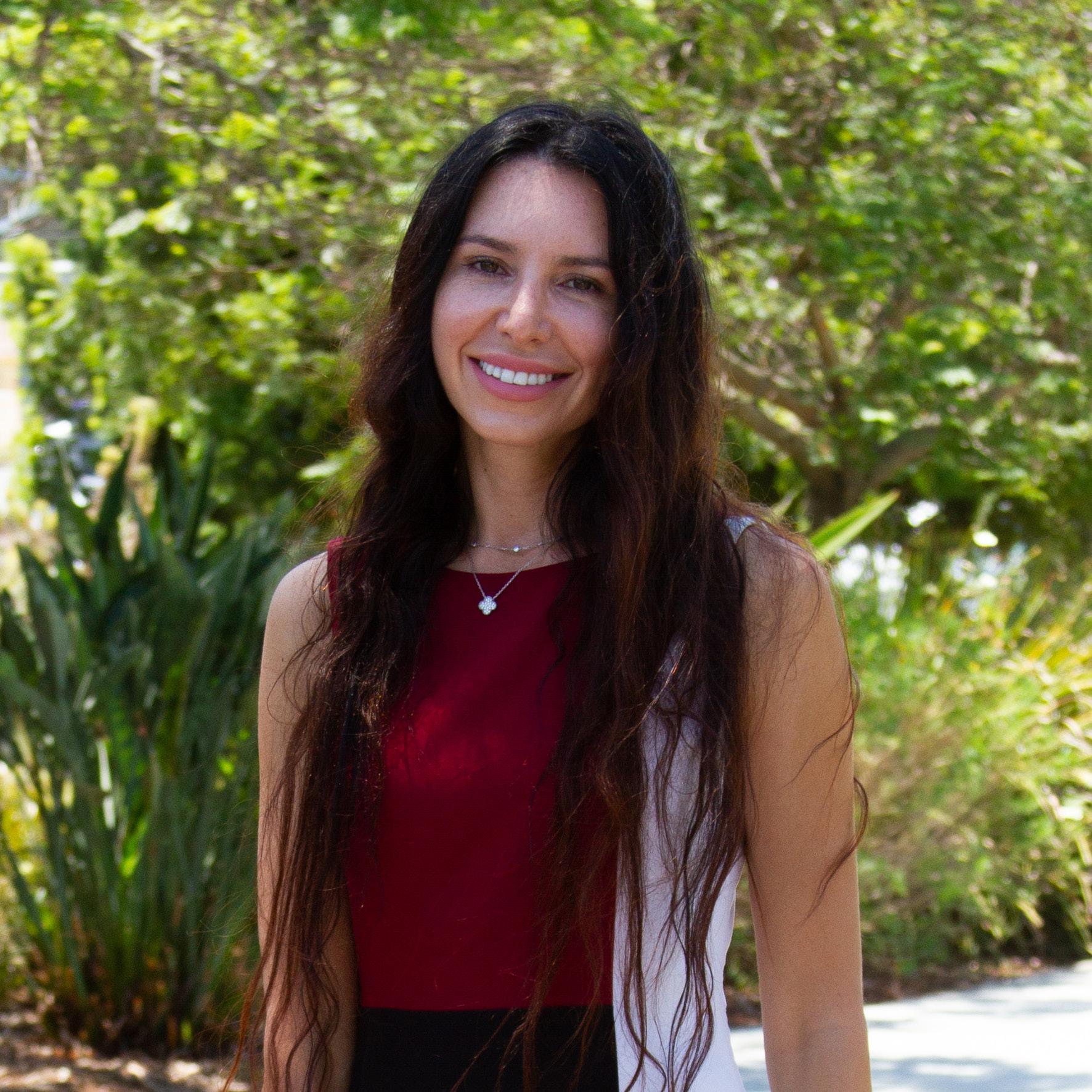
“At first I was hesitant to go for the position because I thought my English language skills were not enough,” said Kogan, 37, who was born in Ukraine. “I am very thankful for my role and for the people who I have met along the way. Before I did not understand what I needed in my life, and now I have joined something so important.”
She first volunteered to serve her peers as the college’s Associated Student Body (ASB) president at Mid-City Campus while studying English as a Second Language (ESL). Kogan was elected as the student trustee for the 2022-2023 academic year in a special election where all ASB presidents from the seven SDCCE campuses competed for the student trustee position. She now represents the 30,000 students enrolled throughout College of Continuing Education.
Kogan was sworn in, along with fellow student trustees Diego Bethea of City College, Phoebe Truong of Mesa College, and Allen Kuo of Miramar College, during the June 9 Board of Trustees Meeting. President Tina M. King introduced her to the rest of the SDCCE community during the college’s fall Convocation in August at the Educational Cultural Complex.
In addition to being a student leader, Kogan is a member of the SDCCE Immigrant-Based Support Program (ISP). The student club supports immigrants, refugees, and English-language learners transitioning to college and the workforce in the United States.
“Joining the ISP was the best experience,” she said. “Not a lot of foreign-born people have these types of opportunities coming to another country, such as taking ESL classes for free and preparing to join the workforce. I never feel alone here, I just feel opportunity.”
With Excellence (WE) magazine recently spoke with Kogan about her role as a student trustee and her goals for after graduating from SDCCE.
Qwhat languages do you speak?
AStates from Kyiv, Ukraine, five years ago. I speak Russian, Ukrainian, and I am learning English.
QWas it hard for you to leave Ukraine?
AIt was hard to leave my parents. I saw them very often and they are my close friends.
QWhat degree did you earn in Ukraine and what did you do for your career there?
AI graduated from the law academy in Ukraine and worked in law for 10 years. For the first two years, I worked in a government office and then for a real estate corporation.
QWhat program(s) are you studying at the College of Continuing Education and how has your experience been?
AI started English as a Second Language classes at level 3/4 a year and a half ago, and now I am completing the level 6/7 English + Workplace Communication Transition to College course. The teachers here are always helpful. I made new friends from other countries and learned how to write a resume to prepare for job interviews.
QWhat are your goals after you graduate from College of Continuing Education?
some profession and work in government. It is important for me to find a job that makes me happy and is somewhere I can make a difference.
QHave you decided what four-year college you will attend?
ANot yet, I am still deciding on what would be the best program for me. I worked with the law in Ukraine, but to become a lawyer here in the United States I would have to start from zero.
QHow is your role as a student trustee going?

AI am proud to be part of the associated student body and serve as student trustee. I have a passion for helping people. In this role as student trustee, I feel important. My hope is to be effective for my fellow students and across the District.
QHow does your family feel about your new role?
My family is incredibly supportive. No one expected me to get this position because I just enrolled at College of Continuing Education to improve my English. My 4-year-old daughter shows me every day why I study and why I work. She understands that we need to study hard to build our home here in America.
A
The San Diego Promise program covers the cost of tuition for two years at San Diego City, Mesa, and Miramar colleges, and provides textbook grants to those students who qualify. The Promise program helps you get where you want to be –whether your goal is to complete an associate degree, transfer to a four-year university, or enter the workforce.
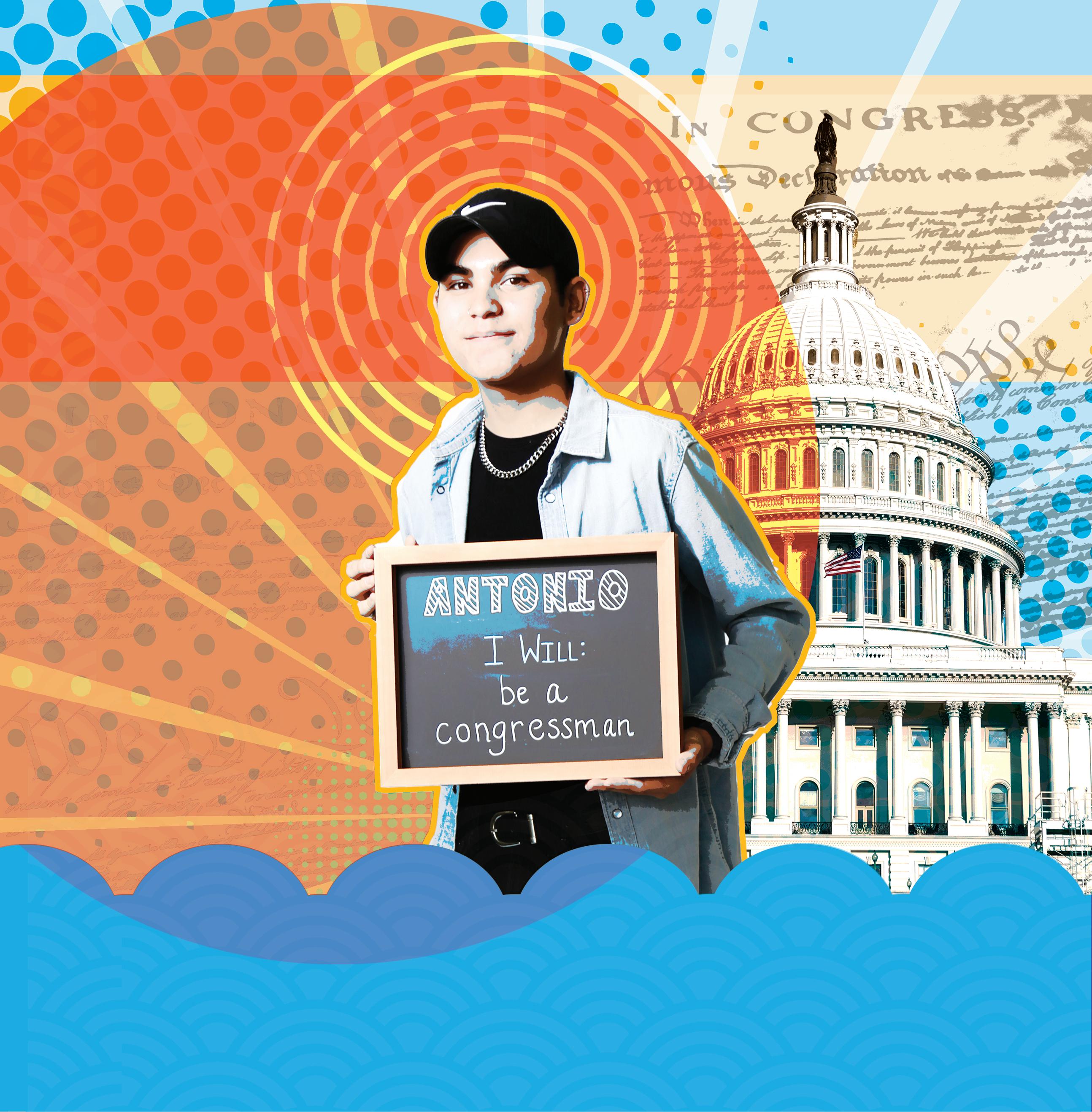
3375 Camino del Rio South San Diego, CA 92108-3883
sdccd.edu Follow us on Facebook, Twitter, YouTube, and Instagram!
facebook.com/sdccd twitter.com/sdccd youtube.com/TheSDCCD instagram.com/thesdccd

San Diego City, Mesa, Miramar, and Continuing Education colleges offer classes to help you launch a career, get an associate degree, or transfer to a four-year university.

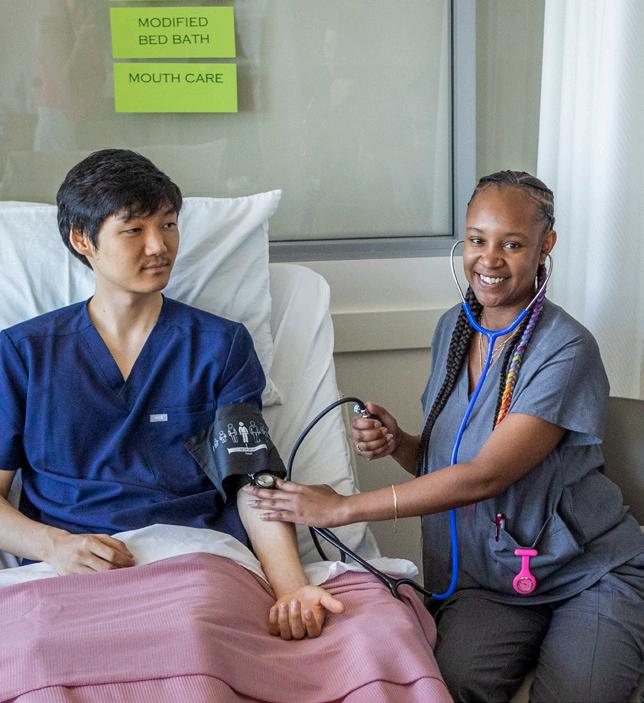
Most students qualify for financial aid. Flexible classes are available in-person, online, or both.
Spring semester classes begin Jan. 30
View the spring 2023 online schedule for College of Continuing Education and enroll in classes at sdcce.edu/spring-2023
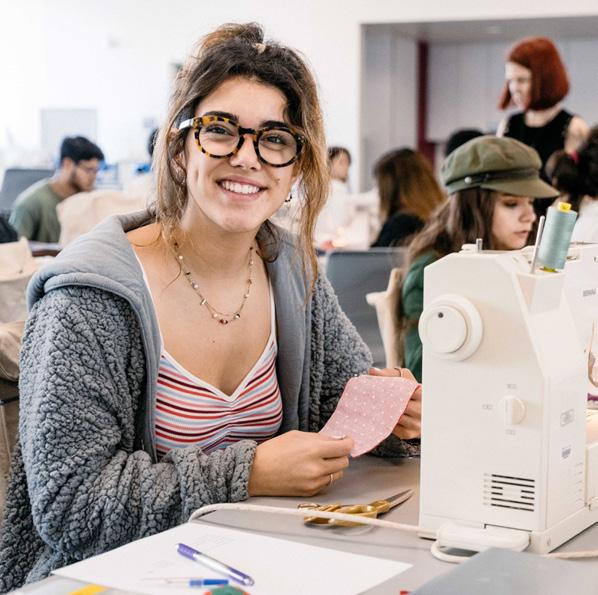
Spring semester classes begin Feb. 1
